Last week, Springfield Armory announced its new SA-35 pistol. Like the company’s 1911 handguns, this iconic design is a modern riff on a highly-regarded John M. Browning design.
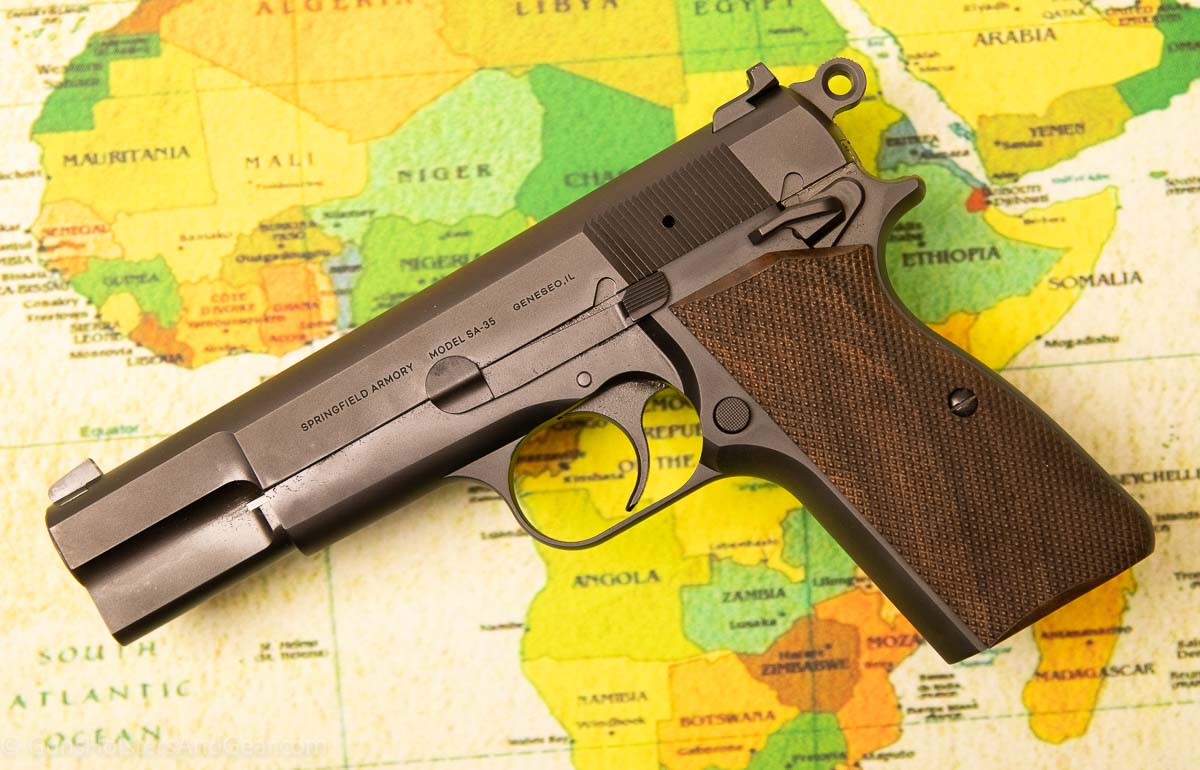
I love history and historic guns, so this one was right up my alley. I wanted to see how close the SA-35 compared to the Hi-Power. Also of interest to me was how Springfield would address some of the long-time (dare I say) flaws of the original.
So, I got my hands on a Springfield SA-35 and headed to the range to see how it shot. This is my review of the pistol.
As a side note, I recommend Will Dabbs’s full history of the Browning Hi-Power at The Armory Life. Be sure to come back and see how the new SA-35 compares.
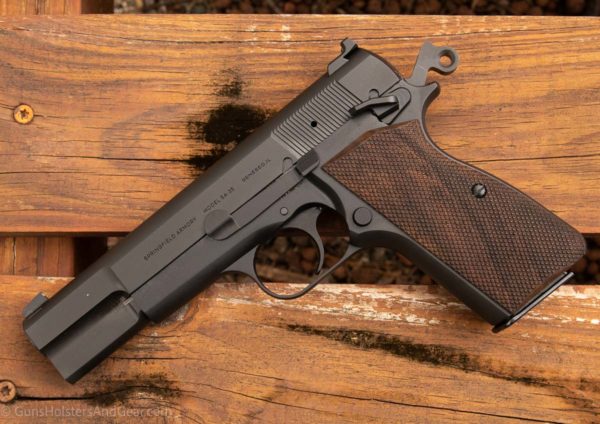
Where to Buy the Springfield SA-35
At the time of this writing, SA-35 pistols are selling for 2-3x suggested retail due to demand. I’m not surprised.
I recommend trying to catch one through our affiliate links:
General SA-35 Information
Springfield Armory designed the new SA-35 to be a modern iteration of the Browning Hi-Power: a pistol that maintains the look and feel of the original while taking advantage of modern manufacturing and needs.
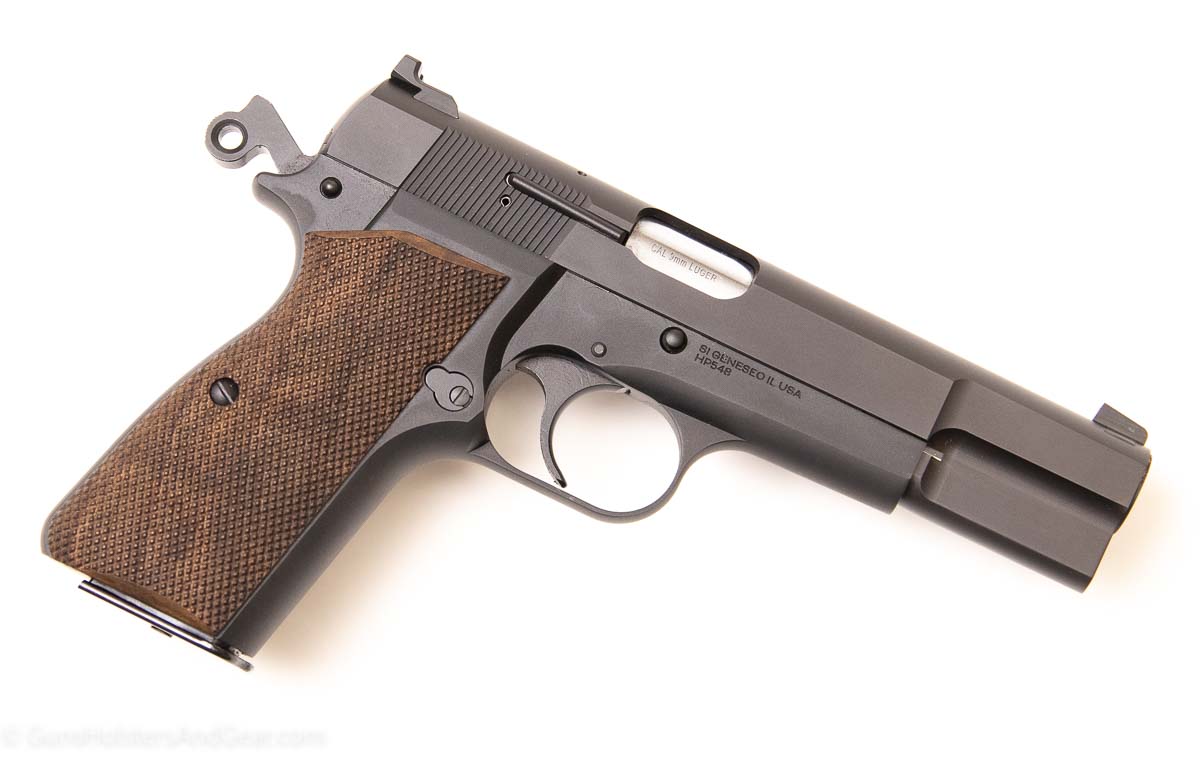
Fundamentally, this is a single-action-only, hammer-fired pistol chambered for the 9mm cartridge. Browning originally designed the pistol for defensive use, and Springfield maintains that capability in the SA-35.
Here are some of the highlights of the SA-35:
- forged steel slide and frame with CNC machining
- improved tolerances while maintaining compatibility with many of the original parts
- improved heat treating for additional strength
- cold hammer forged barrel
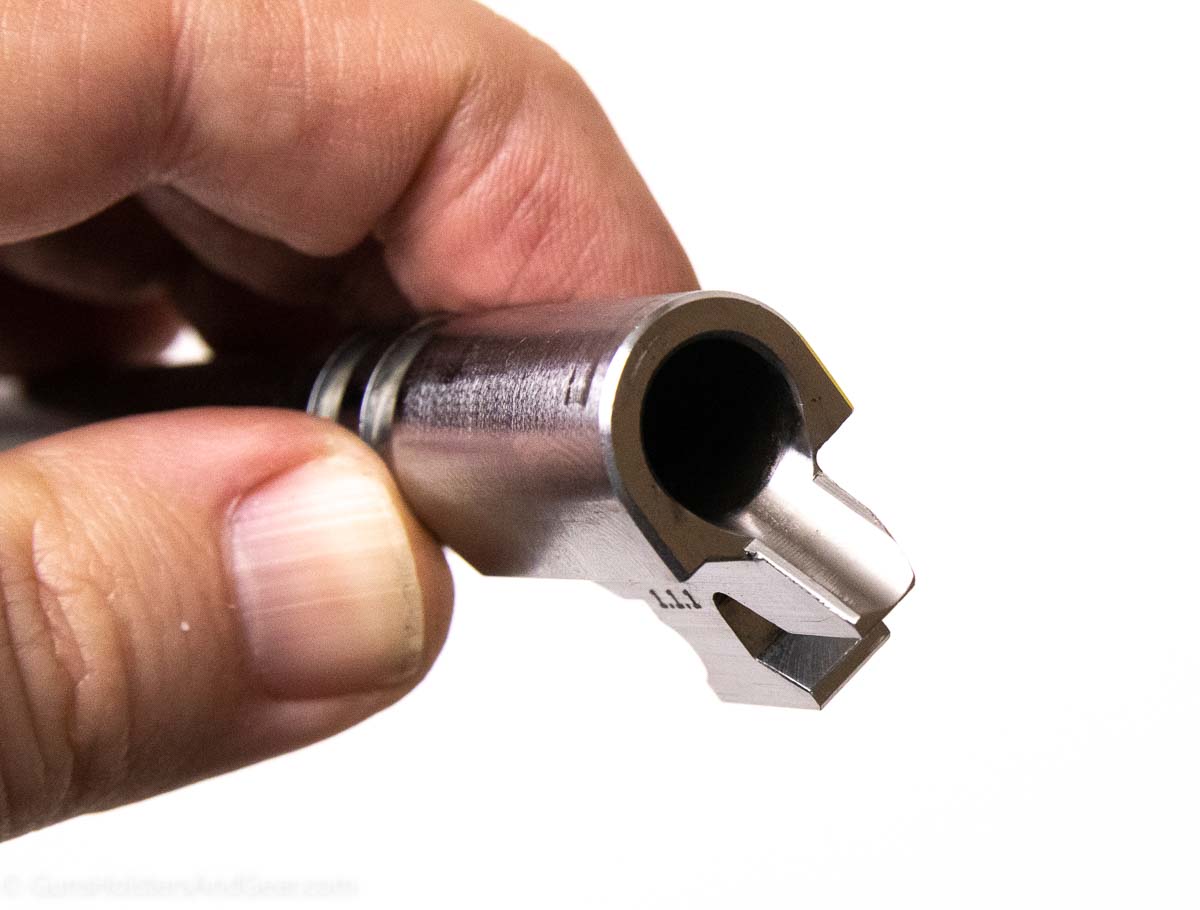
- improved feed ramp geometry for improved feeding with modern hollowpoint ammo
- modern sights
- improved and extended thumb safety
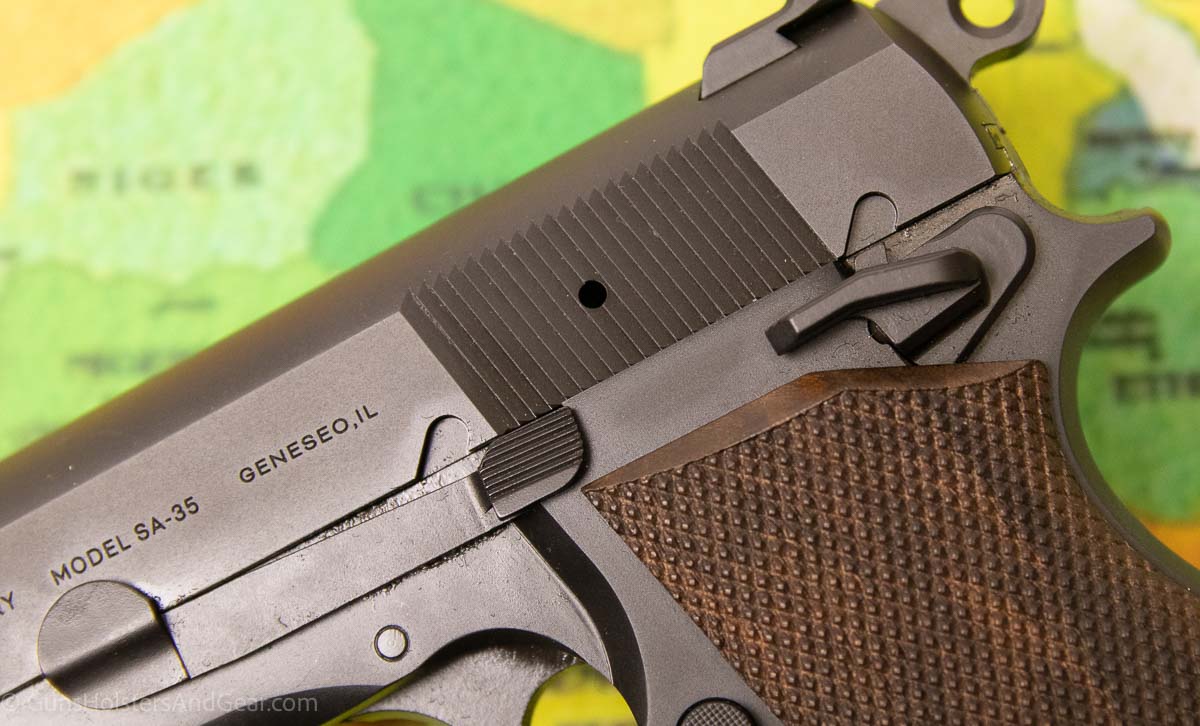
- deletion of the magazine disconnect safety
- updated extractor for improved reliability
- ring hammer with improvements to reduce hammer bite
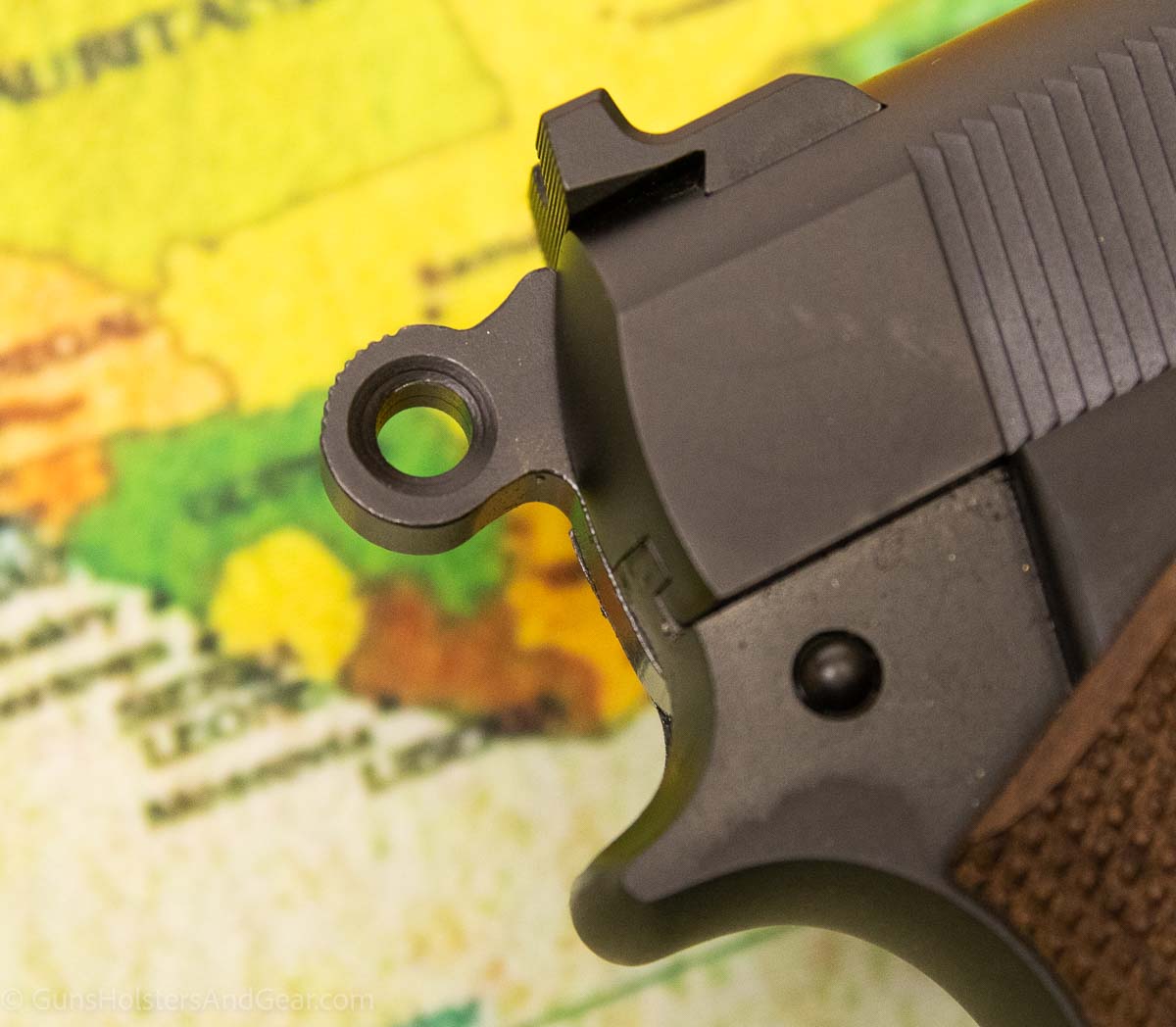
- flush-fitting 15-round magazines and compatibility with original 13-round magazines
- bevelled mag well
- compatibility with existing Hi-Power grips
- Made in the USA
Let’s take a look at some of these features in greater detail.
Forged Steel
Springfield Armory has been very particular about identifying the slide and frame steel as forged and not cast. This is noteworthy because forged steel tends to be significantly stronger than cast in both tensile strength and fatigue strength. For a gun, this is important.
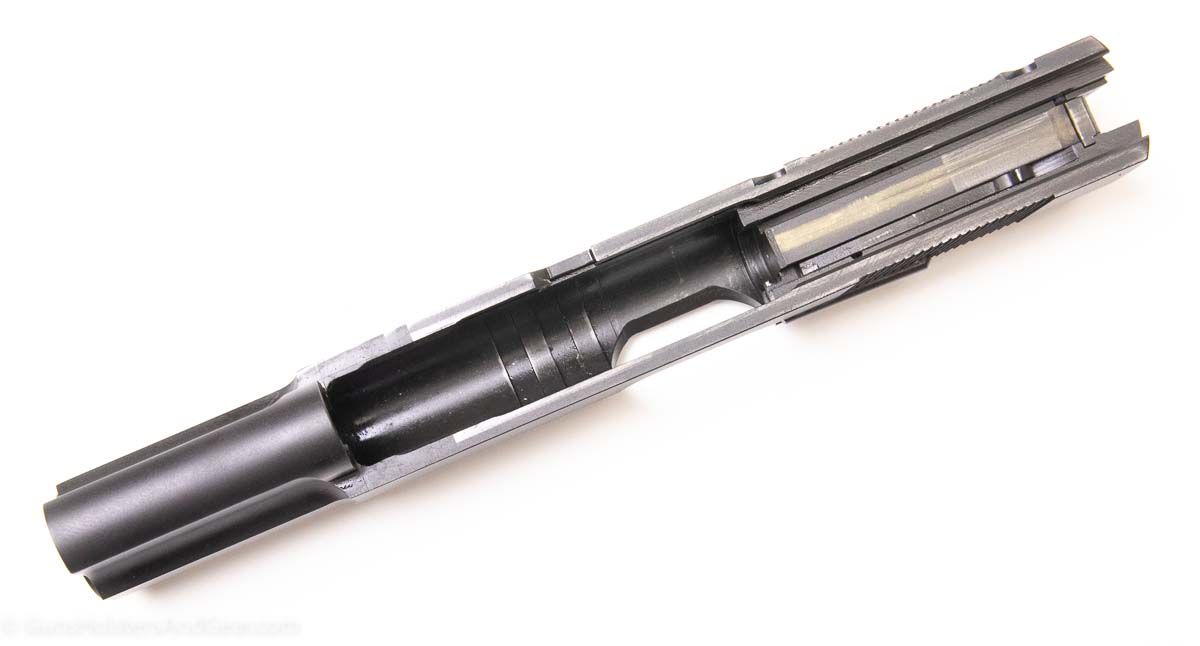
While I am not a Hi-Power historian, it is my understanding that all Browning manufactured Hi-Powers used a forged frame until the company introduced the .40 S&W version. At that point, the company moved the entire line to cast frames.
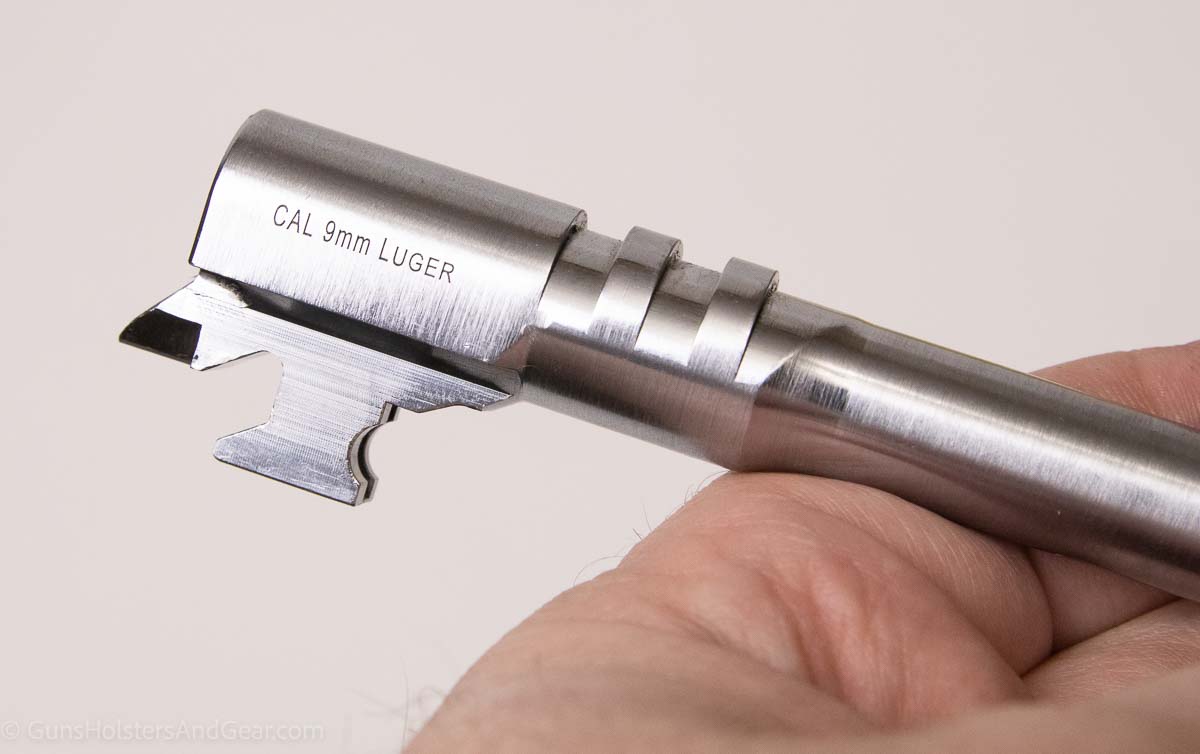
I’ve not been able to get an official word on the recently announced Girsan MC P35. The only information released by the company is that the MC P35 has a “steel frame and slide.” I’ve been told that Girsan uses cast steel for at least some of its 1911 pistols, so my expectation is that its Turkish-made Hi-Power clone does as well.
My experience with the Girsan MC1911 CT was generally positive, even though the company opted for a cheap Chinese red dot that broke within the first 50 rounds of shooting.
Magazines and Capacity
Standard SA-35 magazines hold 15 rounds. This capacity is two more than original Hi-Power magazines. Yet, Springfield accomplished this in the same exact size as the 13-round Hi-Power mags.
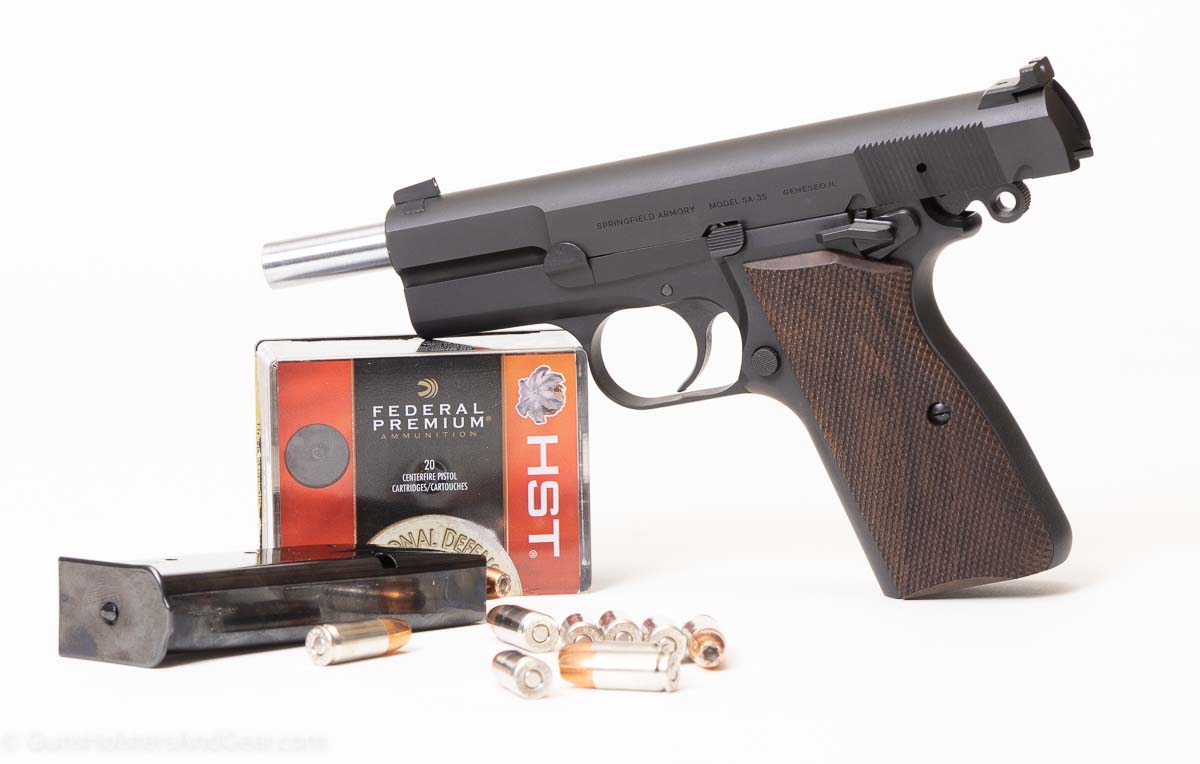
So, if you were wondering if the SA-35 would take original Hi-Power magazines, the answer is yes. Likewise, you should be able to use the new 15-round Springfield SA-35 magazines in older Hi-Power pistols.
The FEG PJK-9HP pistols were a clone of the Hi-Power and used compatible mags. They should work fine in the SA-35 assuming they are still in-spec (a lot of the ones I’ve seen are pretty beat up.)
SA-35 Trigger
Like all other traditional Hi-Power pistols, the SA-35 is a single-action (SA) gun. Normally, SA guns have light, crisp triggers. However, the original Hi-Power pistols suffered somewhat due to a magazine disconnect.
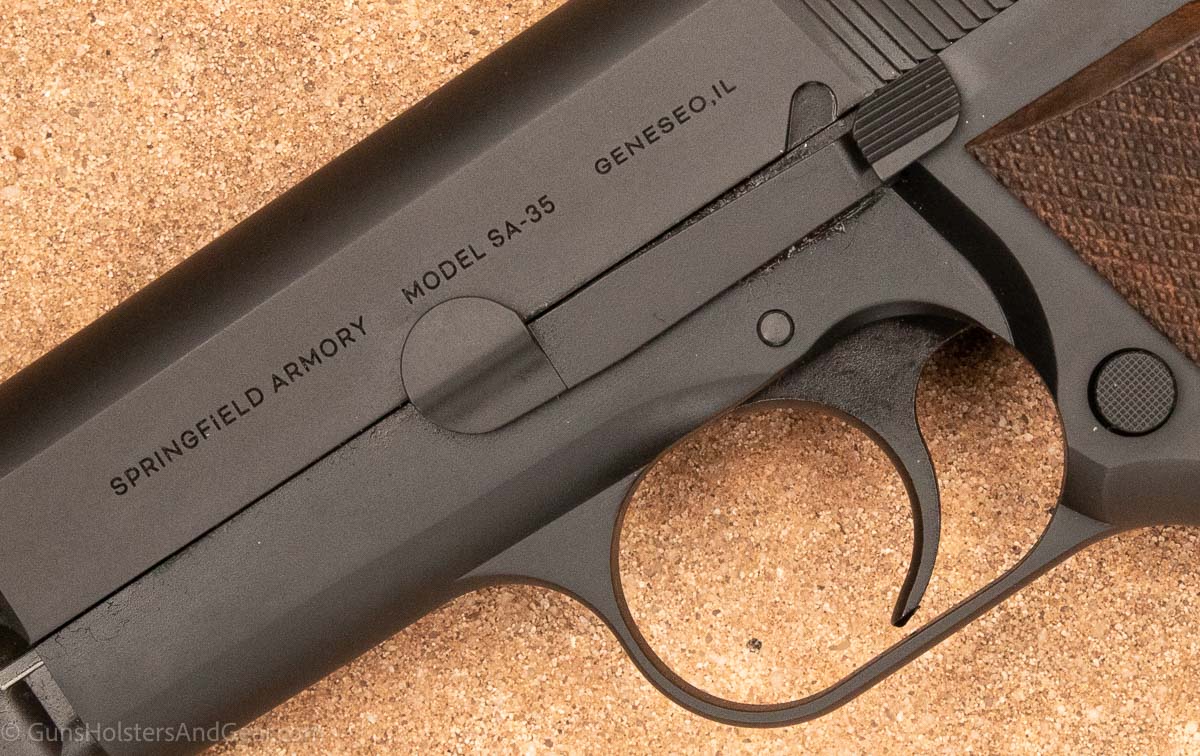
A magazine disconnect is a safety feature included in some pistols that prevents a gun from firing if the mag is not seated. While this feature is debated in its usefulness, most people acknowledge it negatively affected the quality of the Hi-Power trigger.
Springfield Armory tossed the magazine disconnect and re-designed the trigger system for the modern shooter. The result is a smooth pull with a crisp break. The company states the factory trigger pull should be around 5.5 pounds.
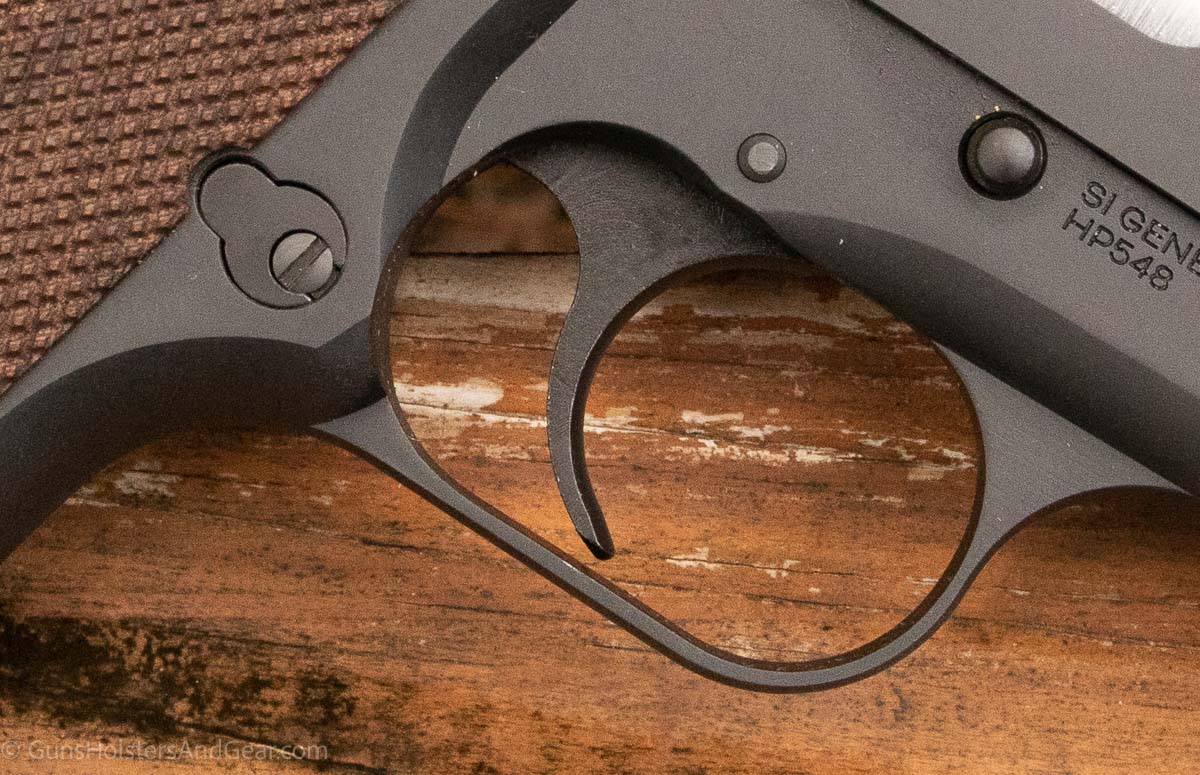
With a Lyman digital trigger pull scale, I measured the SA-35 trigger pull weight slightly less than 5.7 pounds (an average of 10 pulls.) That’s pretty darn close to the company’s estimate.
The SA-35 trigger has a small amount of take up with a very short pull. As I said above, the break is very crisp. It feels as good as any other high-quality factory trigger I’ve tried in recent years.
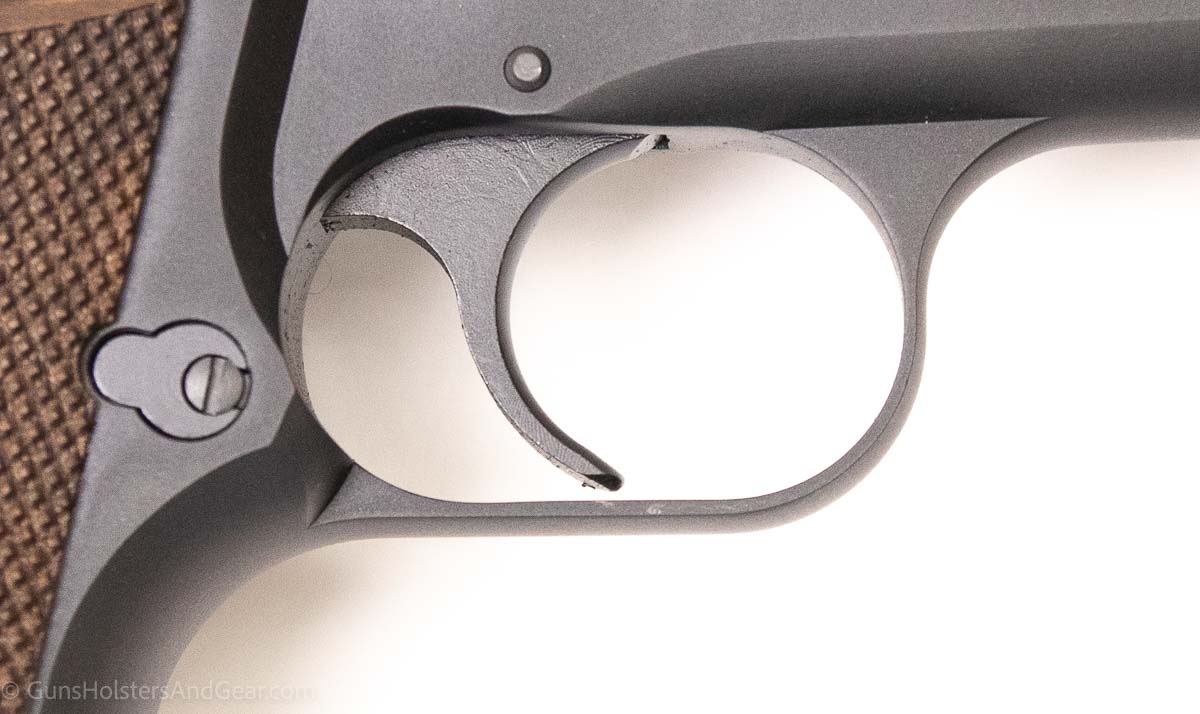
Reset is a touch long and not as pronounced as you might expect if you are used to shooting a modern striker-fired pistol. I could feel the reset when slow-firing, so it’s not as if it is non-existent.
Grips
This is one of my favorite aspects of the new SA-35 pistol.
The grips are finely checkered walnut. As with the original Hi-Power, the stocks are a two-piece design and are screwed into place.
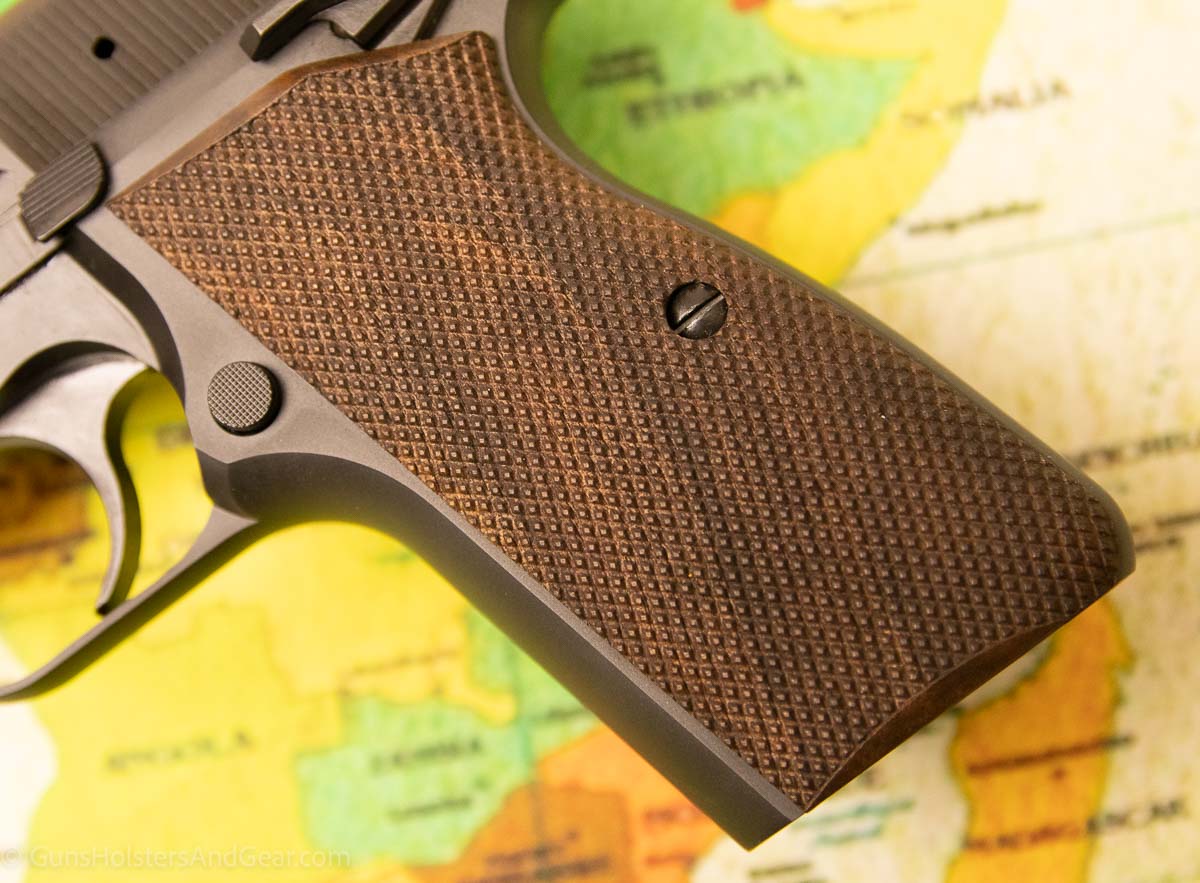
Are SA-35 grips compatible with all other Hi-Power grip panels? Yes.
According to one company rep I spoke with, Springfield intentionally designed the grip panels to interchange with existing Hi-Power pistols. The idea is that any existing third-party grips will mount directly to the Springfield SA-35 without modification.
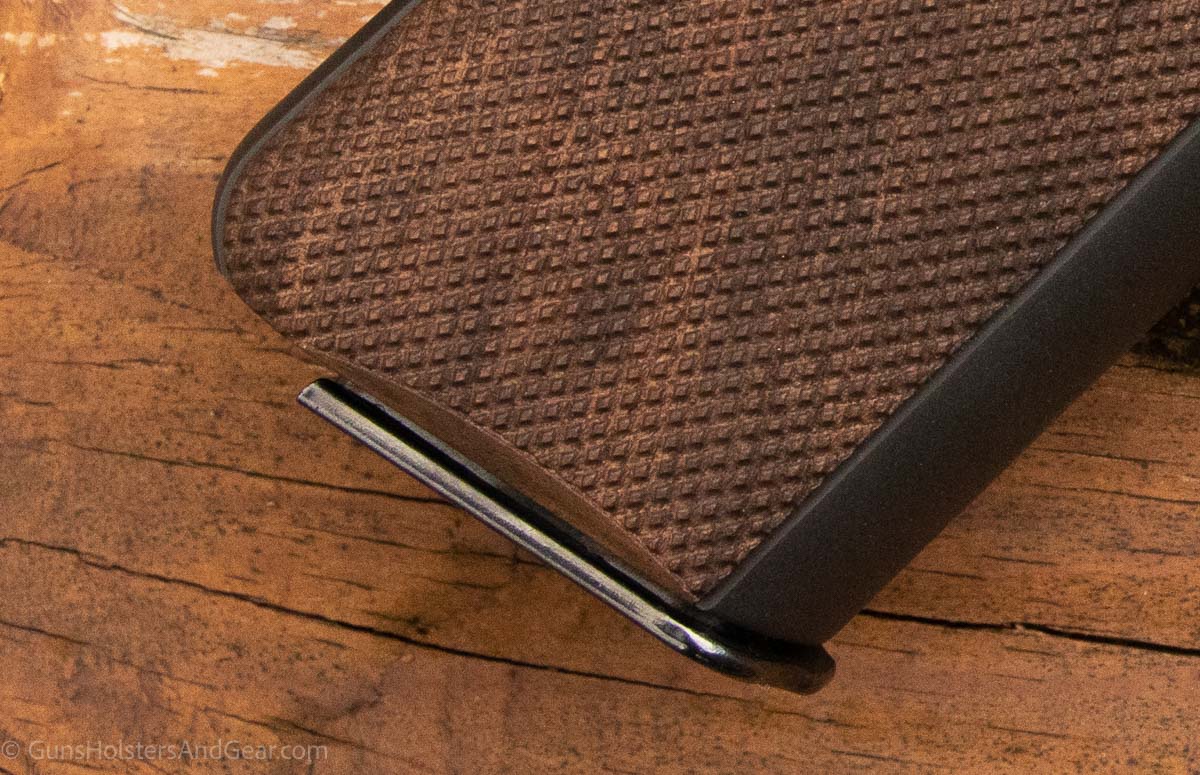
Of course, I love the stock grips. The wood feels perfect in the hand and looks great on the handgun.
The checkering is smooth when lightly moving your hand across them, but they really dig in and provide excellent traction during shooting. I can’t imagine a better set of factory grips on this pistol.
Sights
Another tip of the design hat to the modern world is found in the sights.
In your mind, roll back to the 1920s and 30s when the first Hi-Power/P-35 pistols were being designed. Pistol sights were a seeming afterthought in many designs.
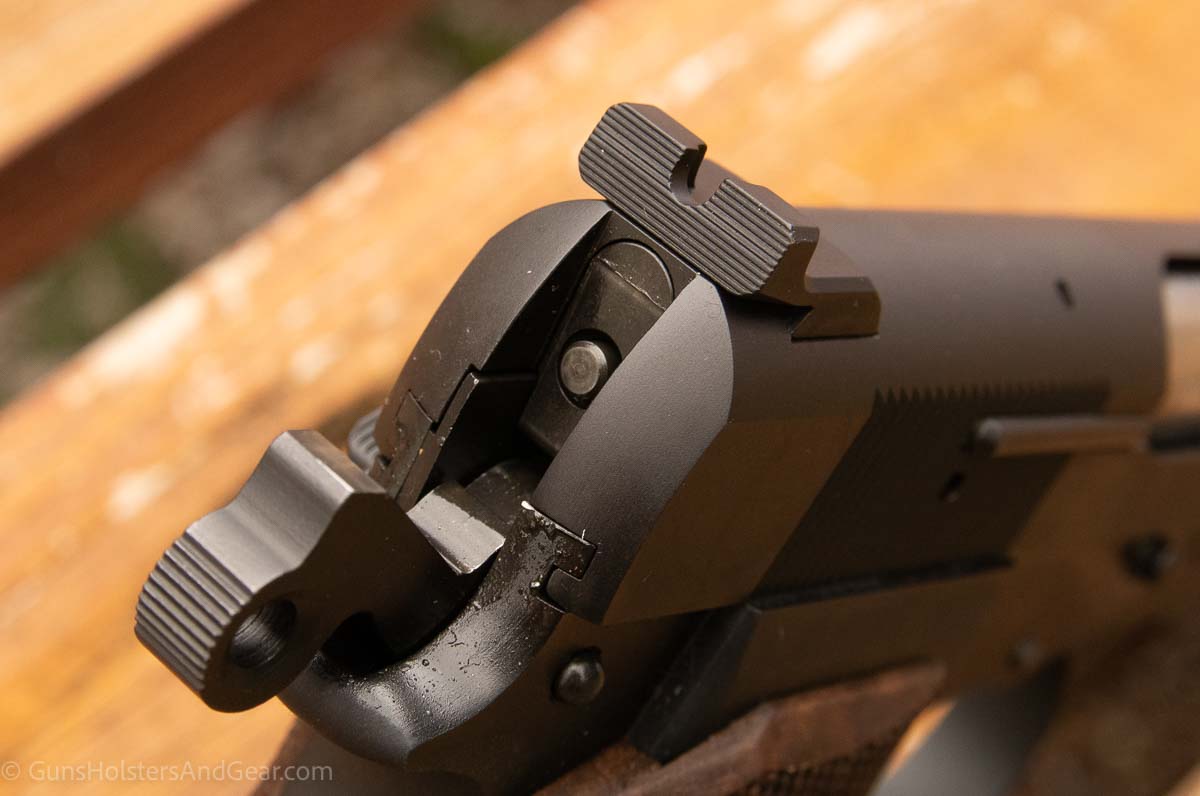
Even in the modern era, the Hi-Power pistols often were equipped with sub-standard sights. You would often see a thin front blade that was hard to see, yet somehow provided enough glare to make shooting in bright conditions difficult.
Springfield opted to go a different route.
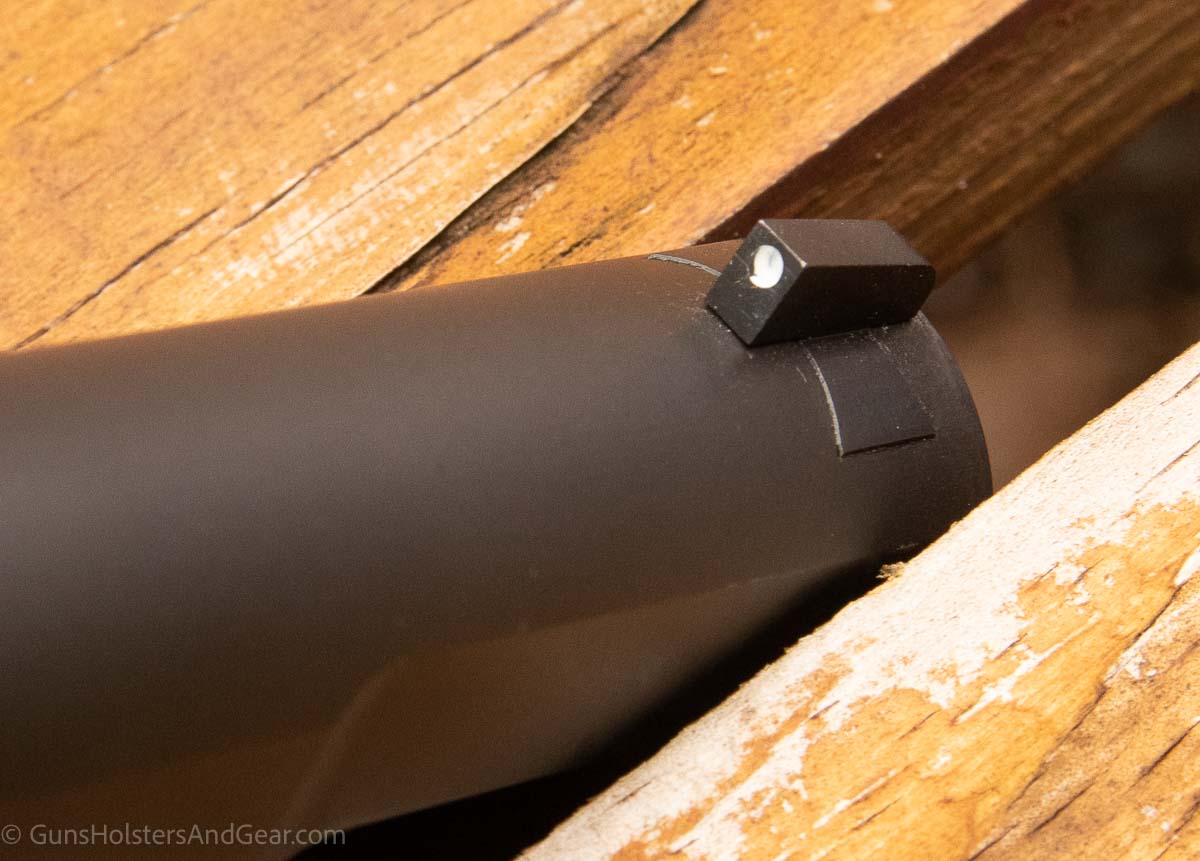
On the SA-35, the company uses a matte black front post with a white dot. While still relatively thin, the front sight feels larger than many of the OEM Hi-Power sights I have seen.
In back, Springfield uses what they call a “Tactical Rack” rear sight. It is a plain black U-notch with serrations to eliminate glare. The leading edge of the sight offers a hook-like profile to enhance your ability to manipulate the slide one-handed.
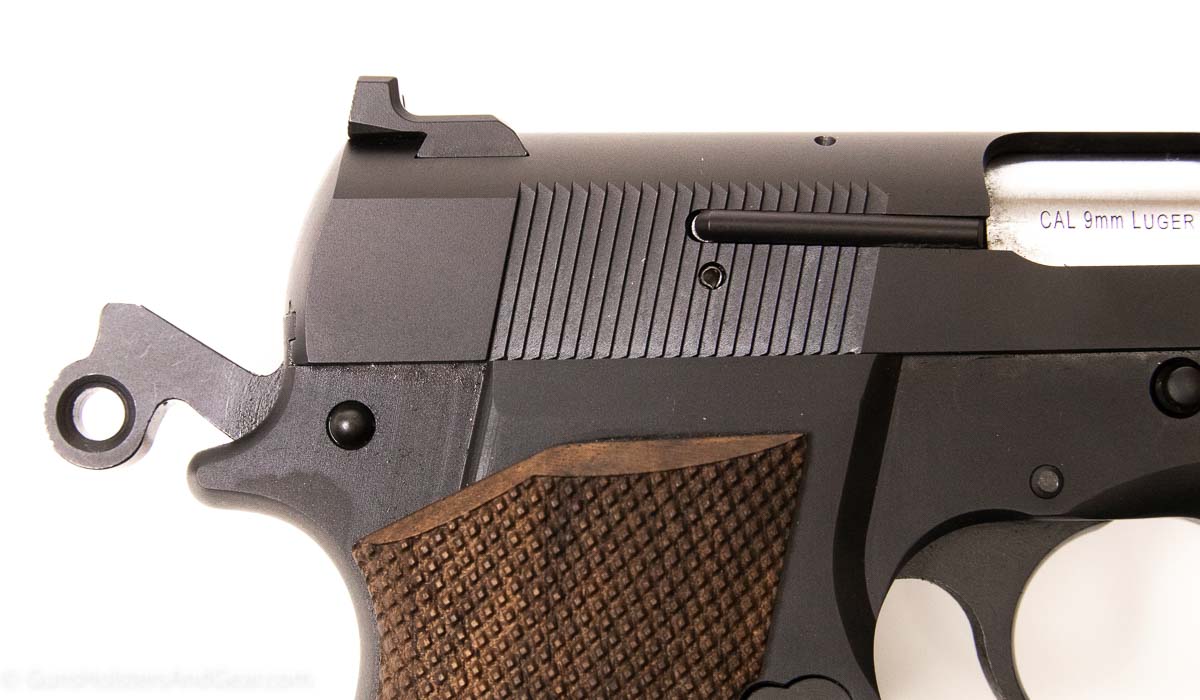
These sights are a significant upgrade to typical Hi-Power sights while still maintaining the iconic look of Browning’s design.
Nevertheless, I hoped for a second option. While the included sights were fine in my shooting tests (read below,) I think I would have been better served with the U-Dot sights found on the company’s Hellcat pistol.
The U-Dot sights offer a much brighter front sight across all lighting conditions – something I am very interested in for any self-defense firearm, even the SA-35.
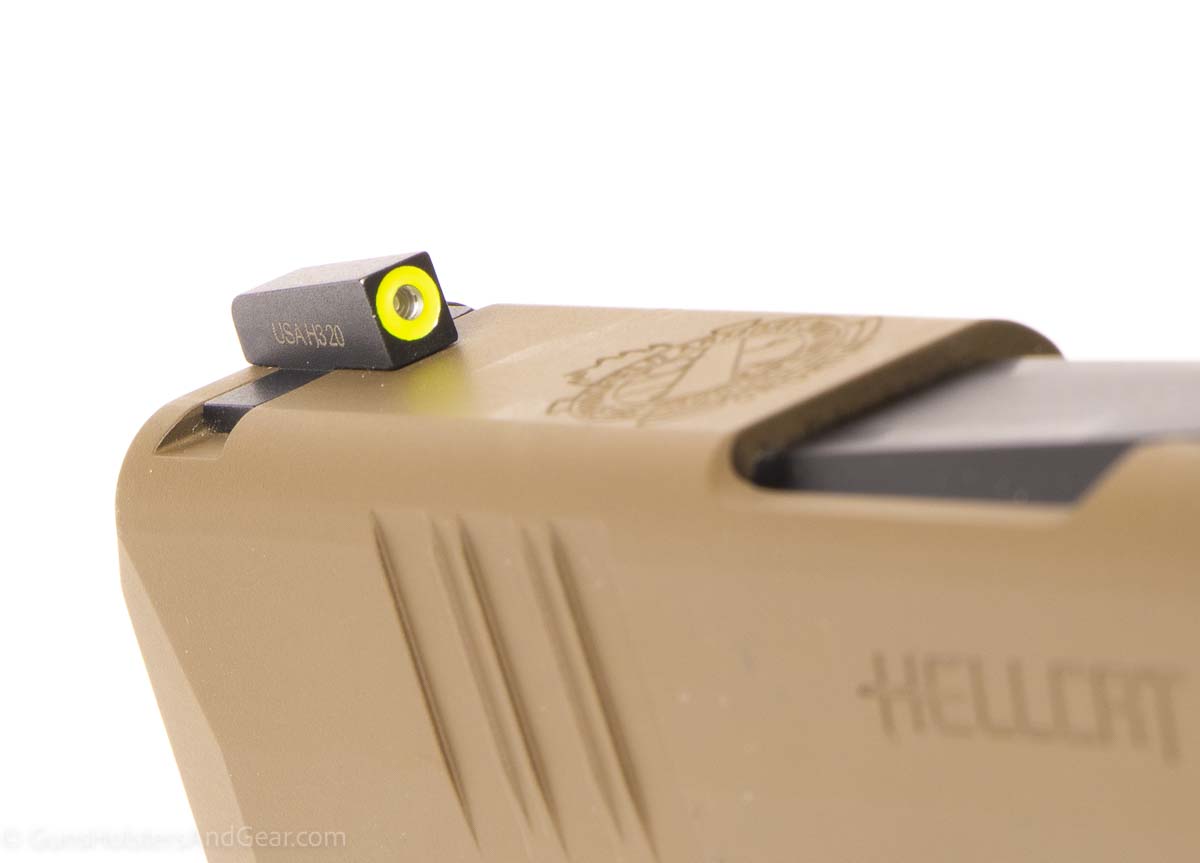
Now, you may see the SA-35 as only a fun shooter or as a collector’s piece. That’s fine. But, I see the Hi-Power platform as a viable personal protection tool. For that purpose, I think the Hellcat sights would have been a great option.
SA-35 Specifications
Here are the specs on the Springfield SA-35:
| Caliber | 9mm |
| Barrel Length | 4.7″ |
| Overall Length | 7.8″ |
| Weight | 31.5 oz (with unloaded magazine) |
| Capacity | 15+1 (one magazine included) |
| Sights | white dot front, Tactical Rack rear |
| Grips | checkered walnut |
| Action | single-action-only |
| MSRP | $699 |
Range Testing
I was eager to get the SA-35 out on the range for testing. Knowing what 100+ years of shooting and manufacturing experience did for the 1911 platform, I wanted to know what more than 80 years might do for the “other” Browning platform.
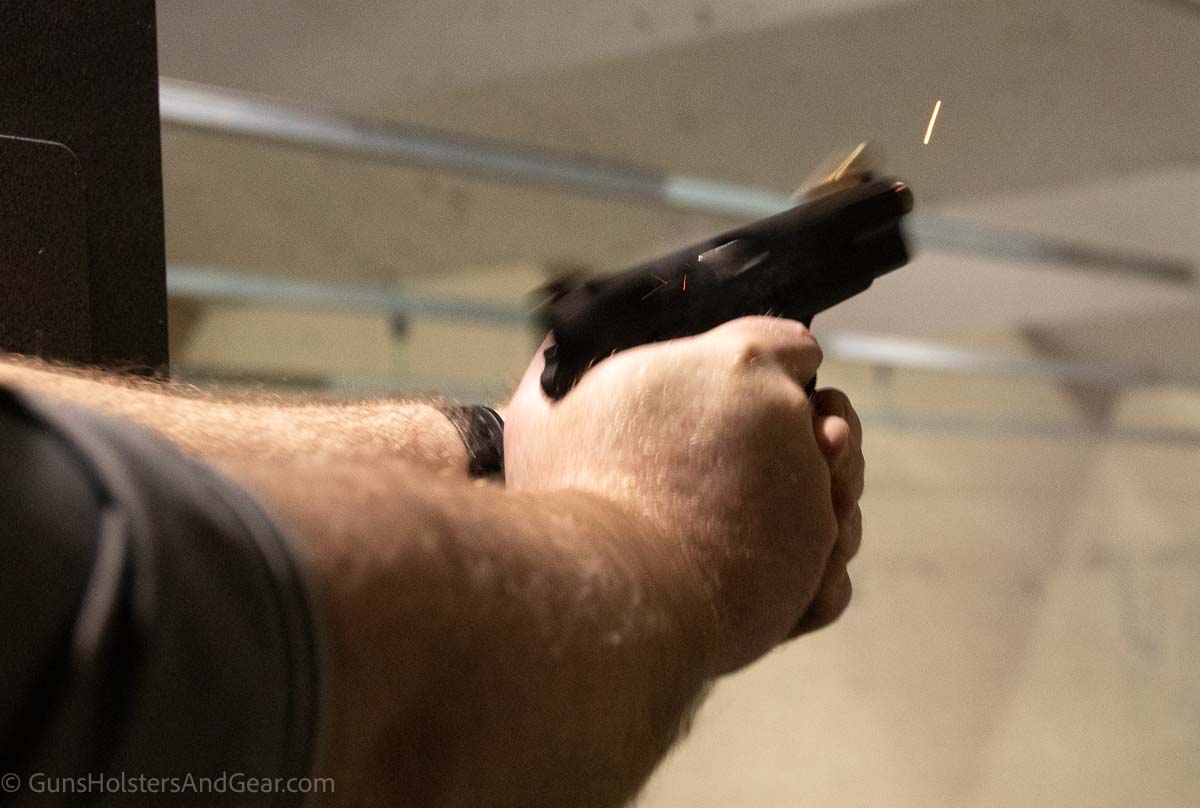
There were a few specific things I wanted to test while at the range:
- reliability with hollow point ammo,
- the quality of the trigger, and
- if they fixed the infamous hammer bite.
Overall, the gun performed exceptionally well, though it missed my expectations by a whisker on the hammer bite issue. Read on for my experiences…
Ammunition Performance
Here’s a look at the ammo I tested in the Springfield SA-35. I selected a variety of loads including standard and high-pressure loads plus ball and hollowpoint.
I wanted to know if the gun would run every kind of ammo or if there would be issues.
| Velocity | Energy | |
| American Eagle 115 gr FMJ | 1,188 fps | 360 ft-lbs |
| Federal HST 124 gr JHP +P | 1,219 fps | 409 ft-lbs |
| Federal HST 147 gr JHP | 1,036 fps | 350 ft-lbs |
| L-Tech 124 gr CuHP | 1,095 fps | 330 ft-lbs |
| Liberty Ammunition Civil Defense 50 gr JHP +P | 2,143 fps | 510 ft-lbs |
| PMC Bronze 115 gr FMJ | 1,147 fps | 336 ft-lbs |
| Sellier & Bellot 115 gr JHP | 1,197 fps | 366 ft-lbs |
| SIG SAUER V-Crown 115 gr JHP | 1,232 fps | 388 ft-lbs |
| SIG SAUER V-Crown 147 gr JHP | 1,039 fps | 352 ft-lbs |
| Speer Gold Dot 124 gr JHP | 1,146 fps | 362 ft-lbs |
| Speer Gold Dot 147 gr JHP | 1,022 fps | 341 ft-lbs |
| Wilson Combat 115 gr TAC-XP +P | 1,120 fps | 320 ft-lbs |
| Wilson Combat 124 gr GDHP +P | 1,136 fps | 355 ft-lbs |
I experienced no malfunctions of any kind. Considering I shot everything from the ultra-fast, lightweight Liberty Ammunition to more traditional projectiles weighing nearly 3x as much, that’s an impressive feat.
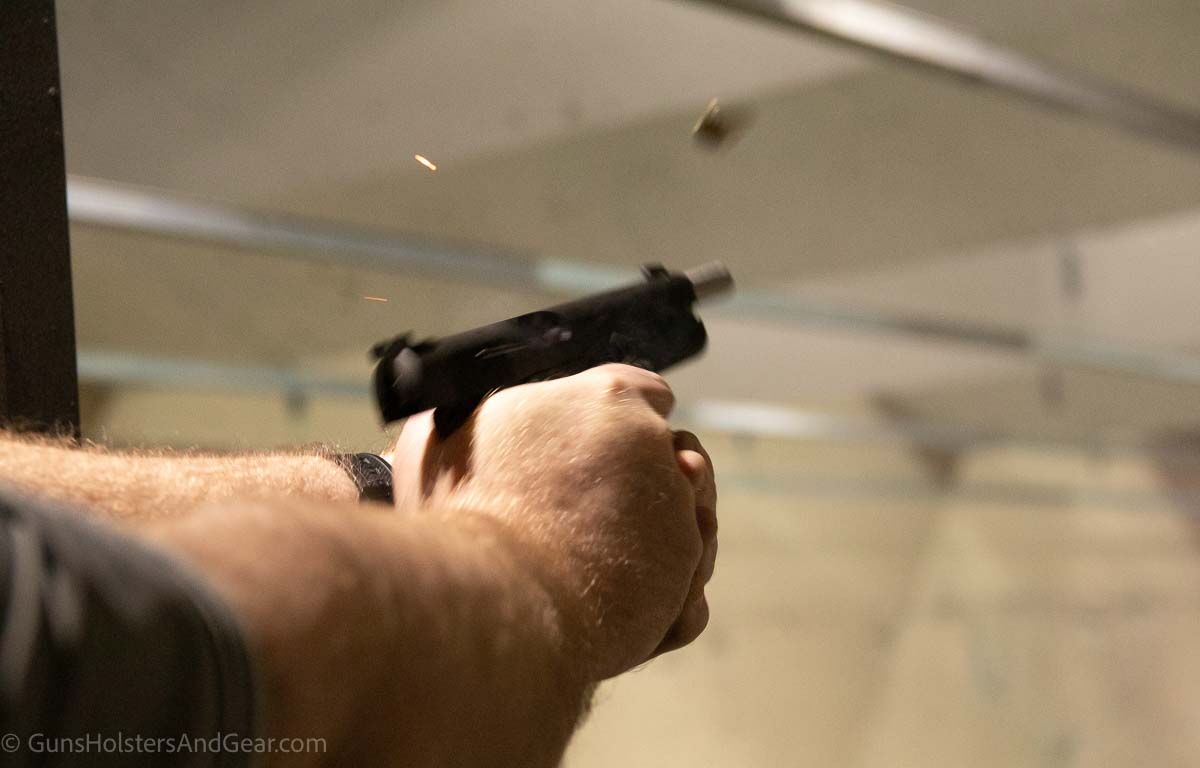
Hollowpoints offered no issues at all for the SA-35. Every round fed, fired and ejected as I would expect.: no break-in time needed. Try that with a NOS Hi-Power from the 1930s.
So, reliability was a big win for Springfield.
Trigger and Accuracy
I described the trigger feel earlier in the article, but let me repeat the important part: it is light with a crisp break. On the range, it felt exceptionally good.
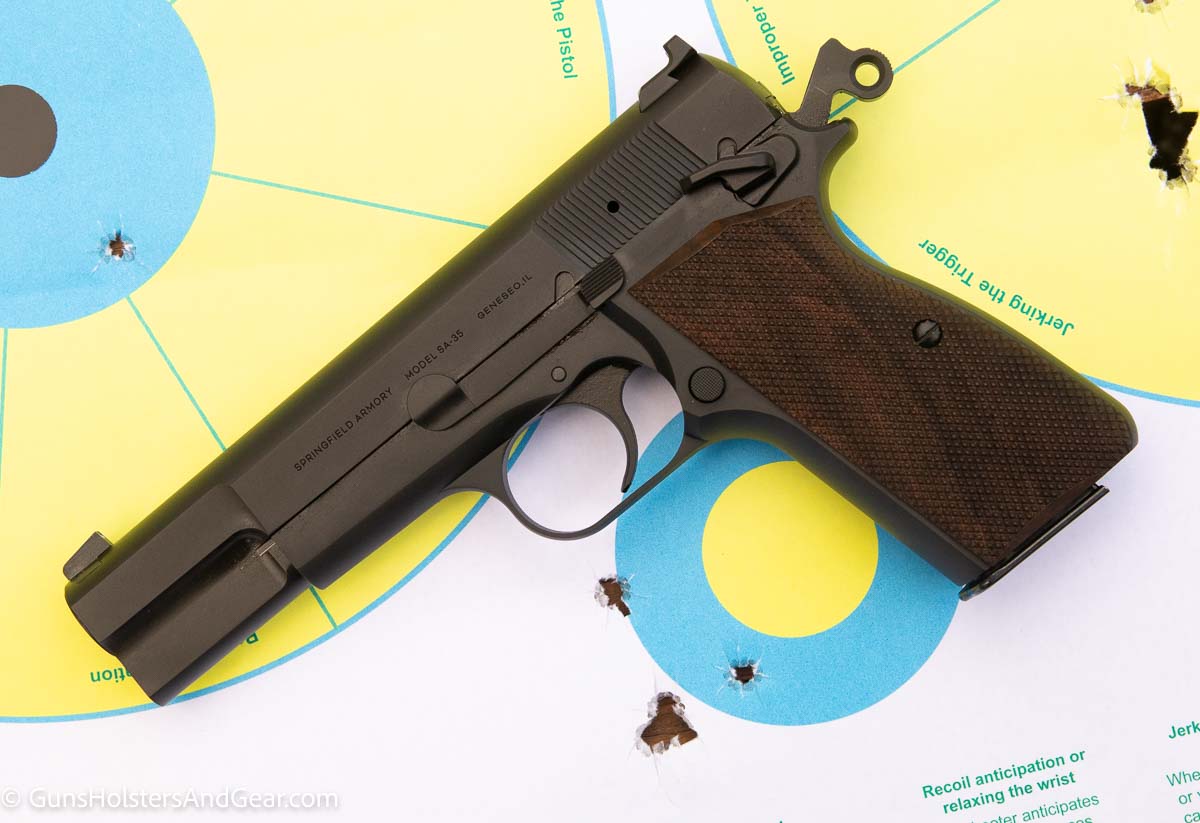
While the trigger pull is just part of the overall shooting process, it has a major impact on accuracy.
All of the loads made sub-2″ groups at 7 yards using my backpack as an improvised rest. Some were around an inch. Without any rest, I still managed around 2″ or less – even with my increasingly arthritic hands.
So, the accuracy is very good in this gun. However, I suffer from stubby finger syndrome. While I consider my hands to be in the medium range, my gloves tend to be sized as large. Nevertheless, I have relatively short fingers.
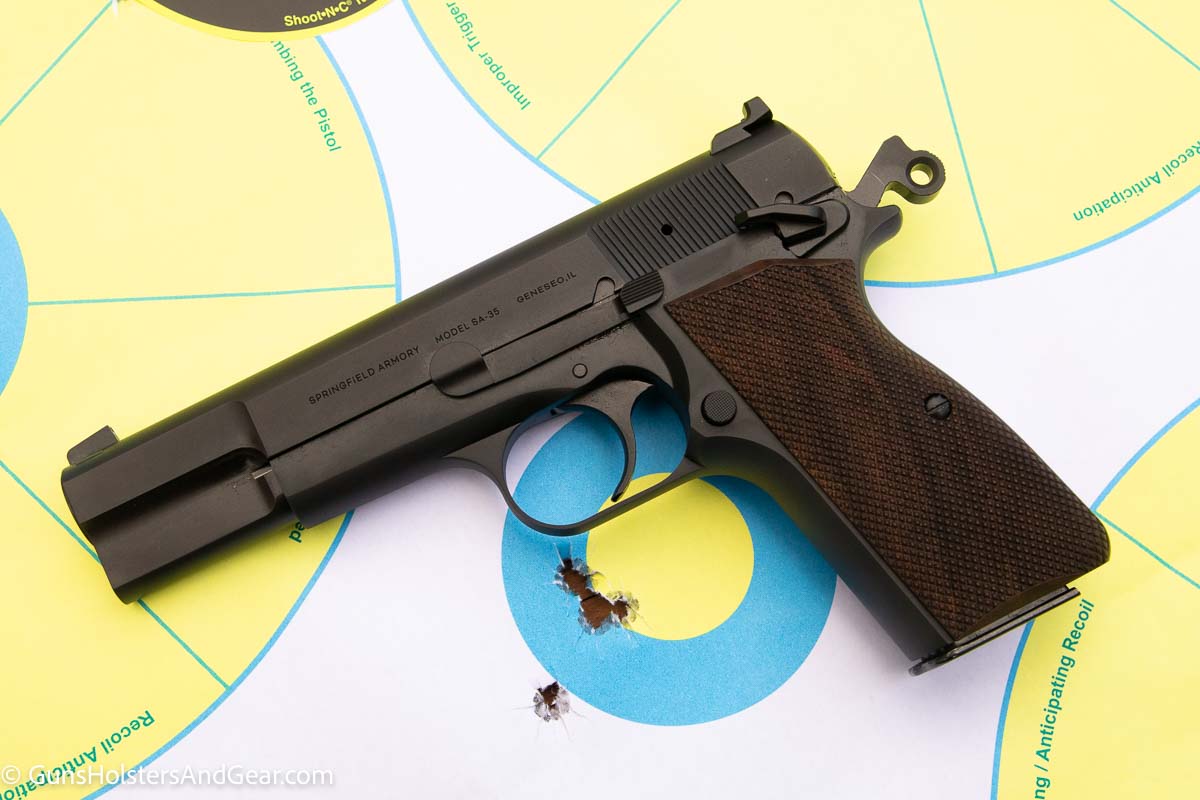
Consequently, traditional hammer-fired pistols like the Beretta 92, SIG P226 and Smith & Wesson 3rd Gen often require me to twist my hand slightly to get the proper amount of finger on the trigger shoe. Often, this causes my shots to go low left.
I experienced the same problem with the SA-35. It isn’t the gun’s fault. I just have the hands God gave me and I have to work with them as best I can. So, many of my shots were low, left.
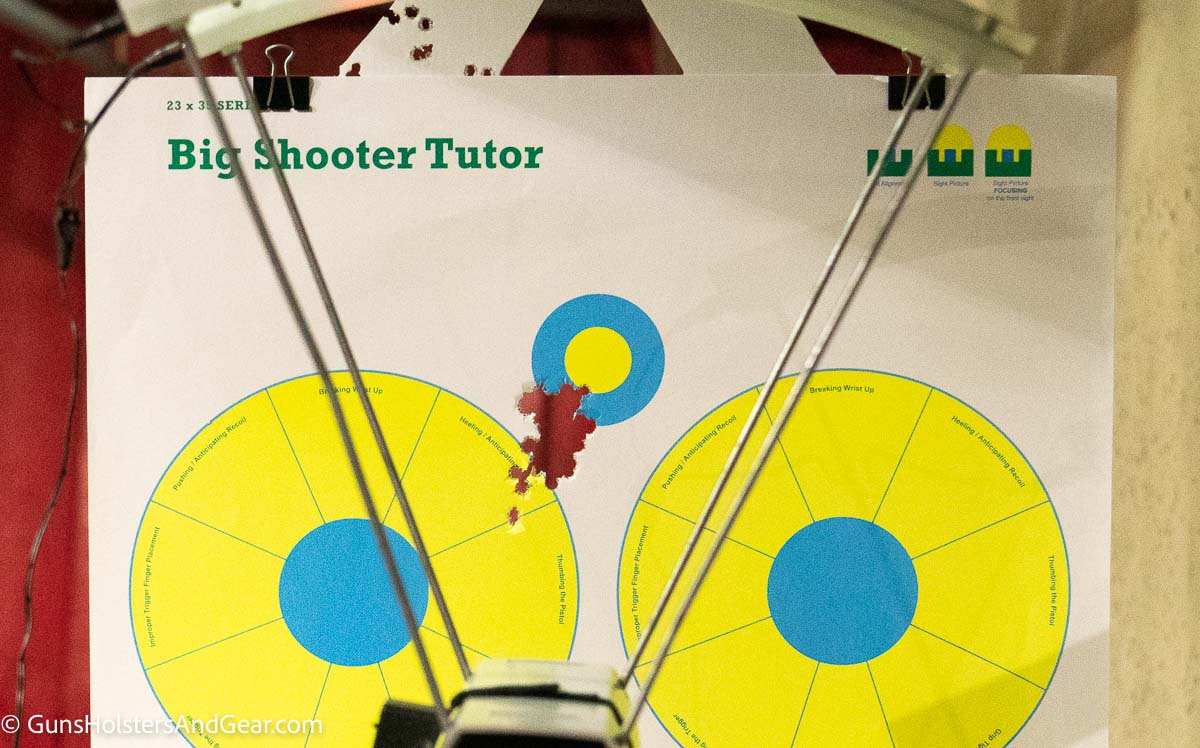
A friend at the range had no such issues and ate the center of a bullseye with the gun at 7 yards.
So, I consider this another win for Springfield – assuming you don’t have stubby fingers.
Hammer Bite or Sharp Corners?
As with early 1911 pistols, some people have problems with hammer bite from the original Hi-Power designs. This is something that Springfield Armory set out to correct.
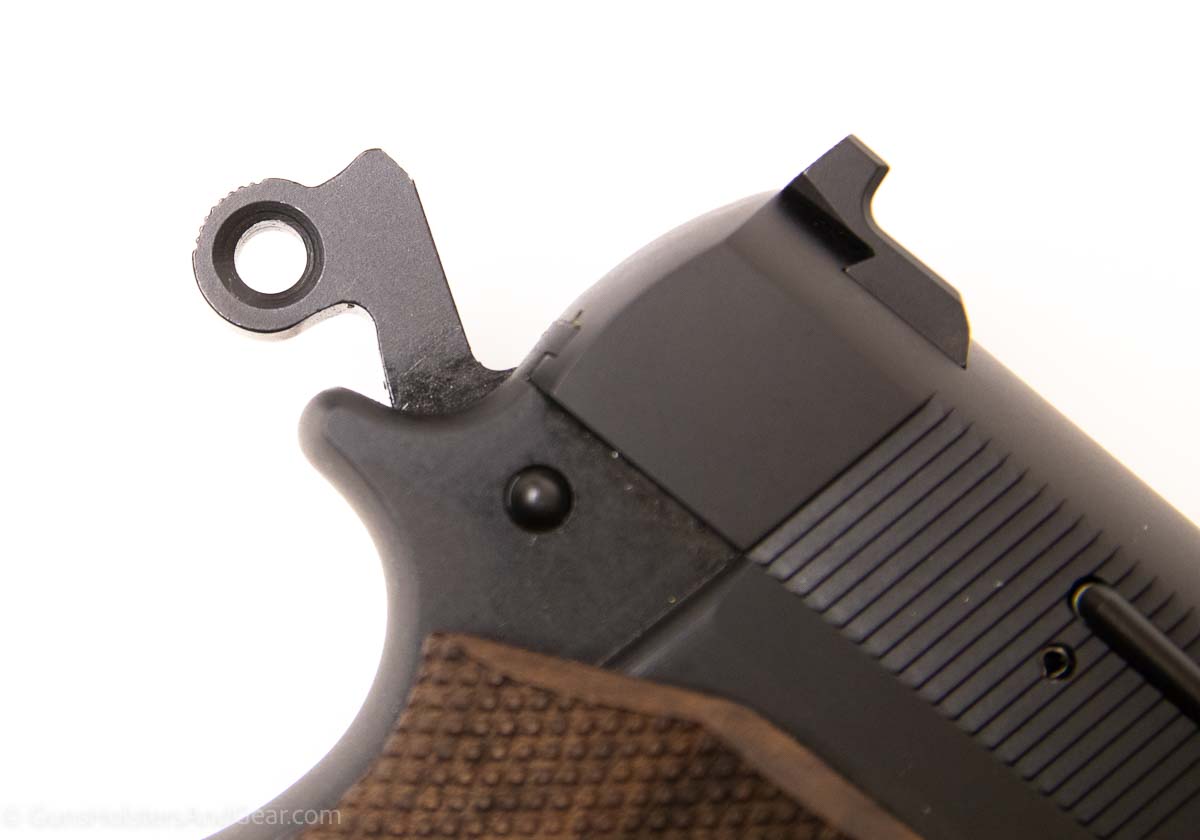
What is hammer bite? Hammer bite is a problem where the hammer of a pistol comes back far enough to hit the top of the hand holding the pistol. Hammer bite can cause minor discomfort or even injury including abrasions and bleeding.
Many original Hi-Power pistols used a spur hammer which seems to be the more frequent biter. Other Hi-Power pistols use a ring-shaped hammer.
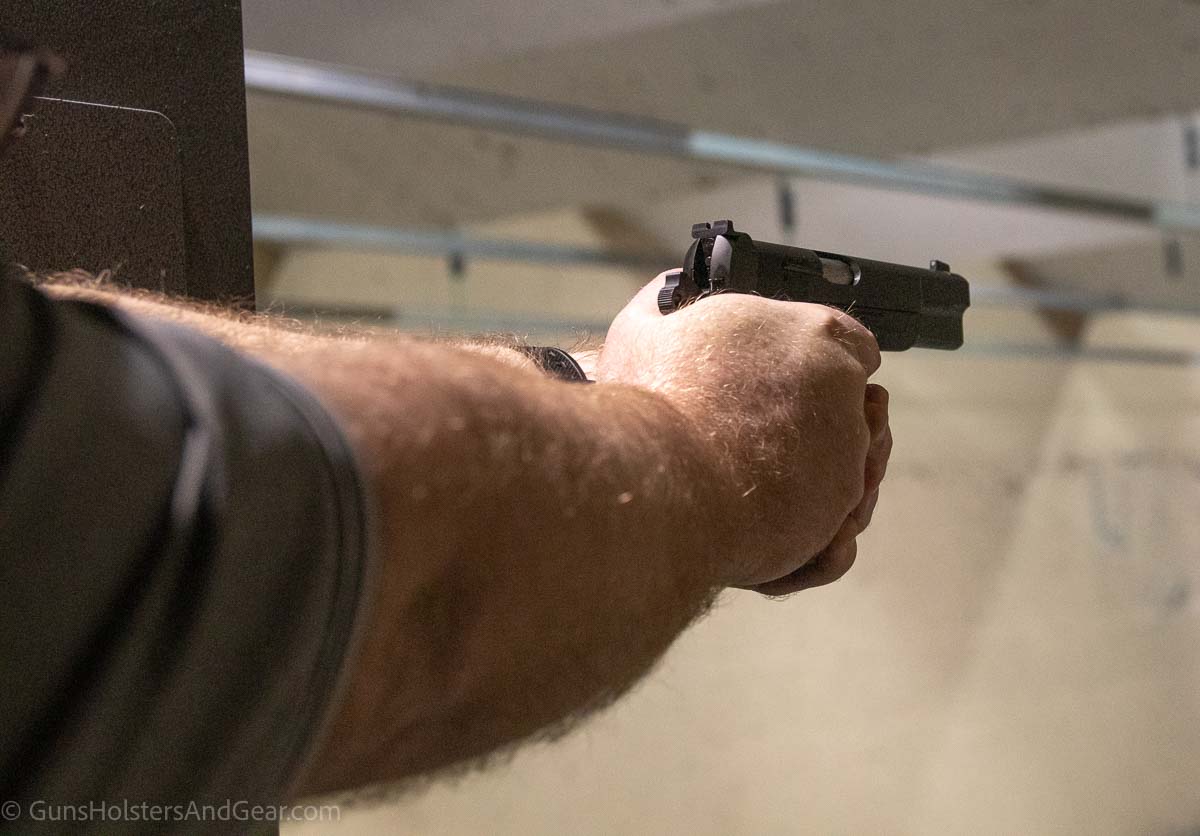
Springfield Armory opted for a ring-type hammer with slight changes to decrease the problems of hammer bite.
Nevertheless, I still had the SA-35 hammer brush the web of my hand. It wasn’t true bite, but it was close enough to suggest that others might have a problem. For me, the friction resulted in a small amount of redness and a sensation similar to an itch. It didn’t hurt, and I suffered no injury.
My friend who also shot the SA-35 didn’t have bite issues. However, he found some discomfort in the edges of the short beavertail. It seems that the corners on the side of the beavertail tend to dig into the web of his shooting hand. Perhaps Springfield can bevel the edges of the beavertail in the next version.
How to Clean the SA-35
While the shooting is the fun part, cleaning the SA-35 is an important aspect of ownership. Fortunately, field stripping the pistol isn’t as hard as you might think.
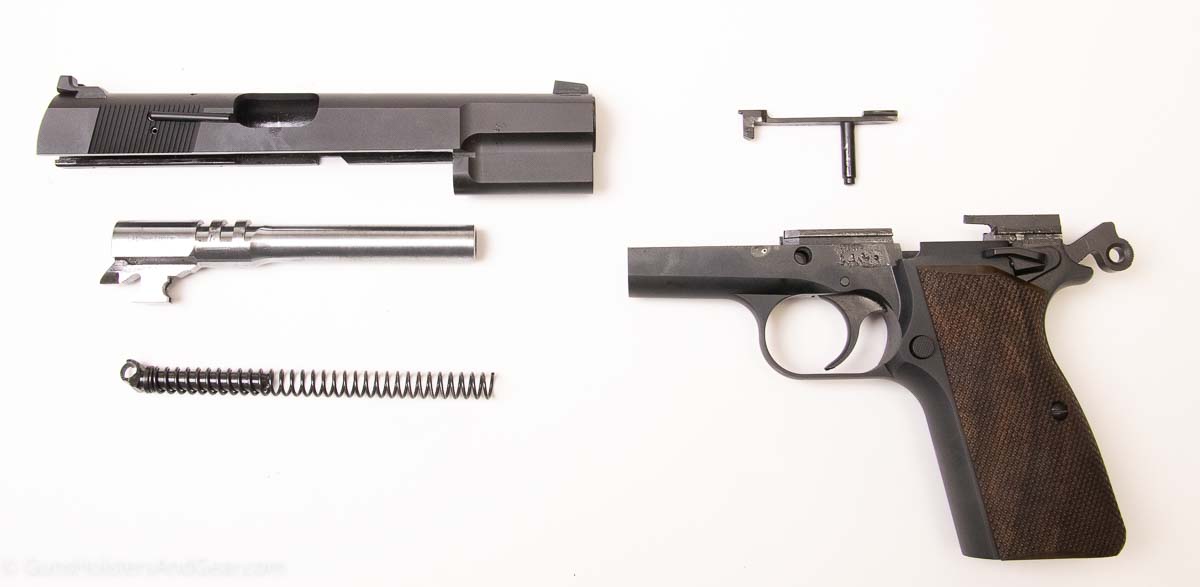
Here’s the process for field stripping and cleaning the SA-35:
Step 1 – Ensure the Gun is Unloaded.
Remove the magazine and lock the slide open. Visually check the chamber to make sure no cartridge is in the gun. Use your pinky to physically ensure nothing is in the chamber.
Too many people are injured or killed by guns that people thought were unloaded. It is your responsibility to make sure the SA-35 is truly unloaded and safe to clean.
Step 2 – Lock the Slide to the Rear
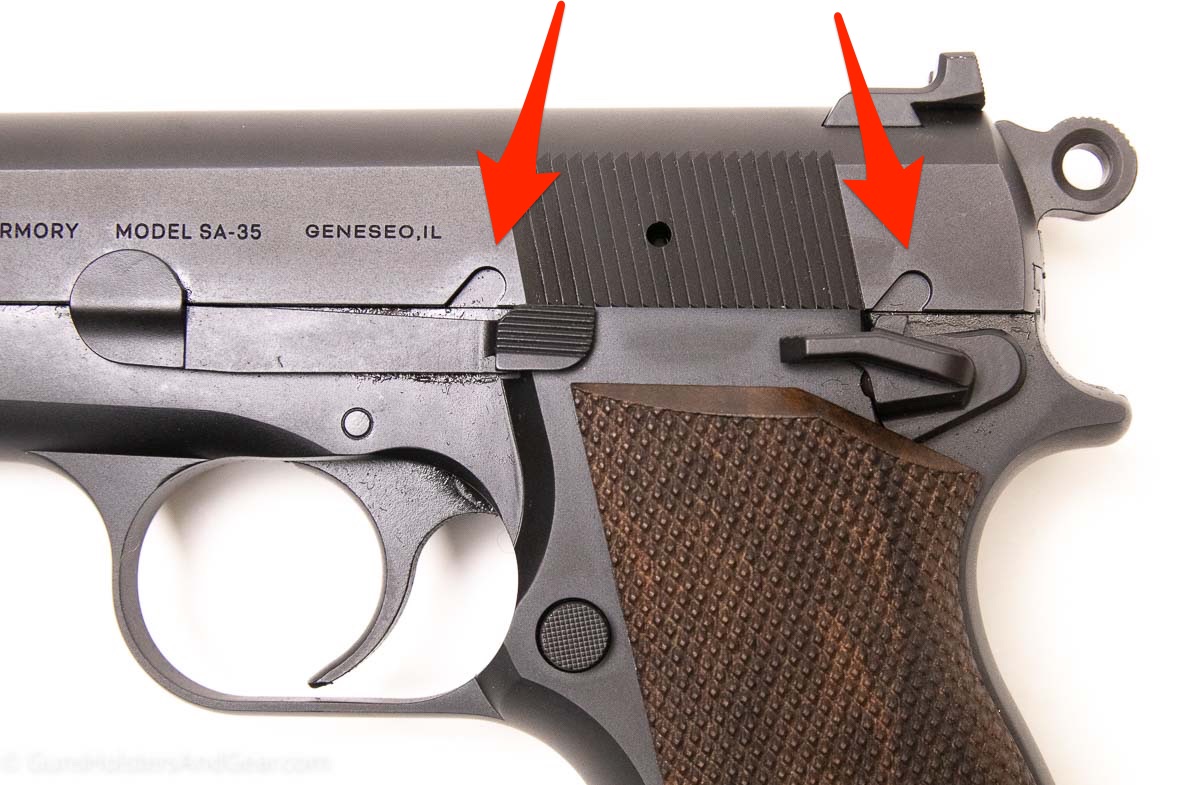
Pull the slide all the way to the rear and push the safety – not the slide stop – up into the takedown notch.
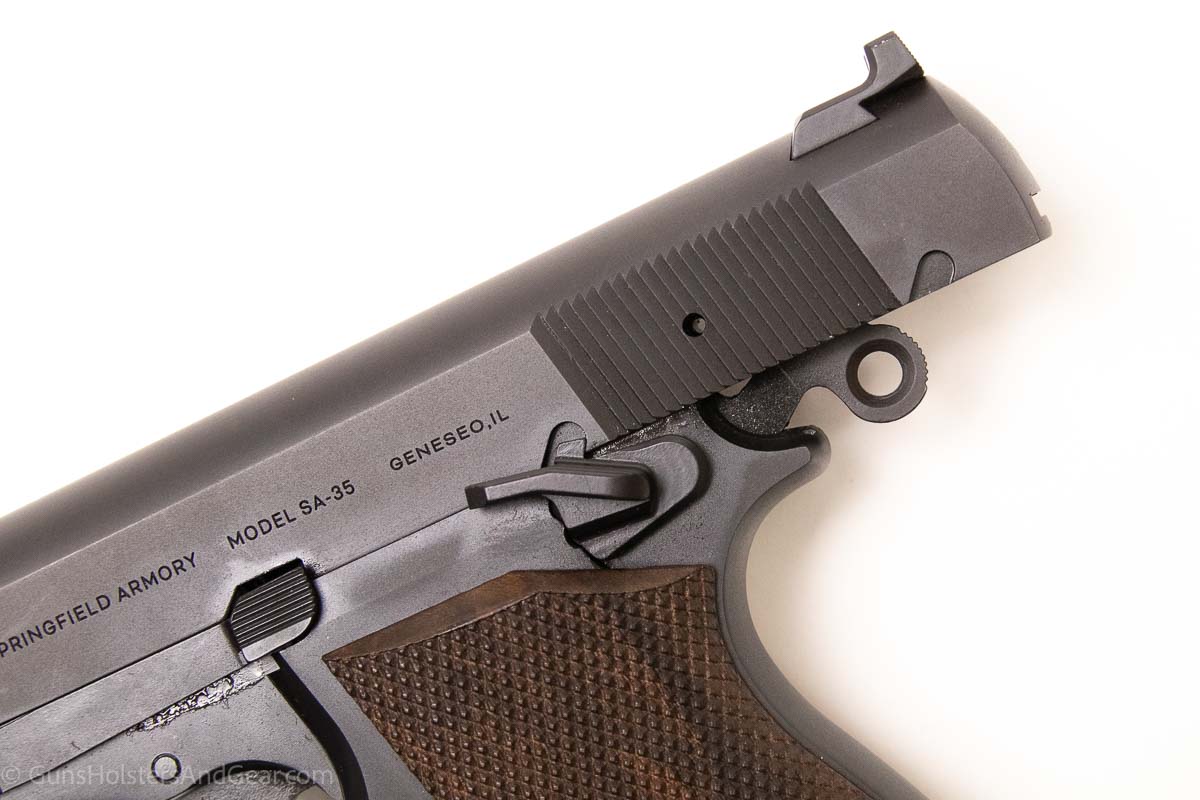
Step 3 – Remove the Slide Stop
With the slide locked to the rear by the safety, the tension on the slide stop lever has been removed. It should wiggle easily.
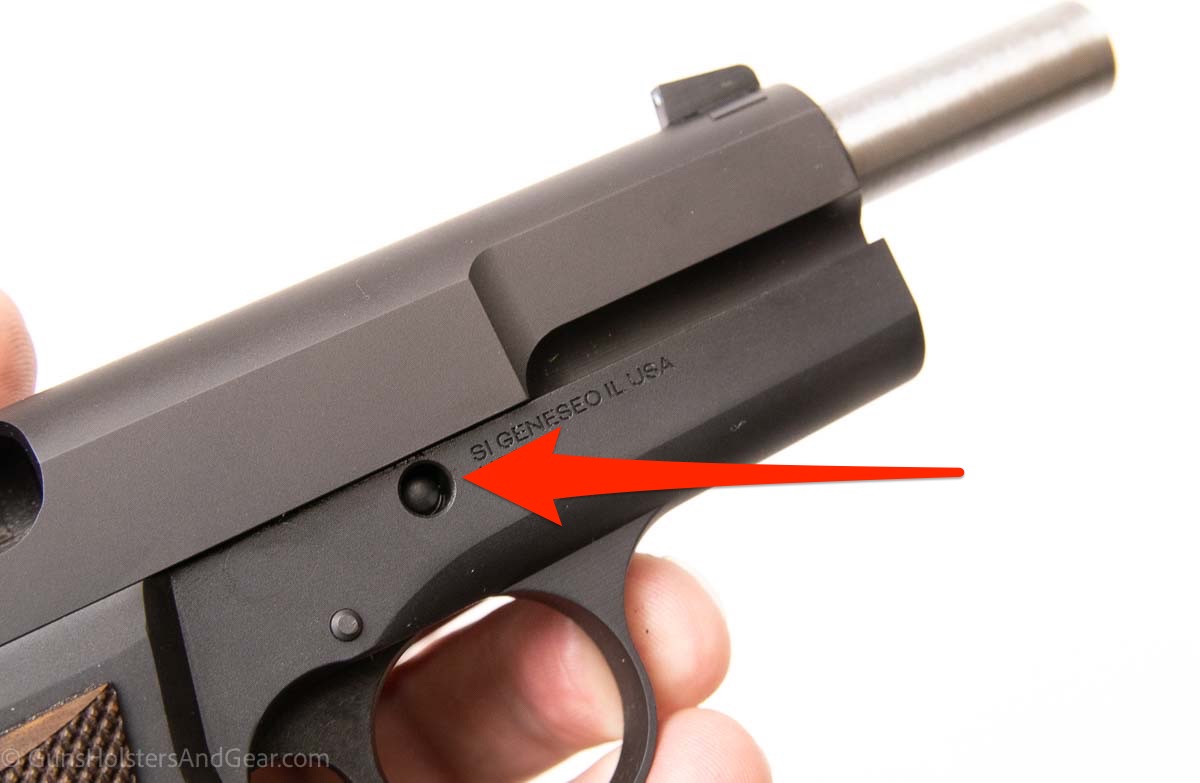
Press the take down lever out of the SA-35 frame by pressing it from the right side of the gun. You can also grab the edges of the lever on the left side and pull/wiggle it out. It should come out relatively easily.
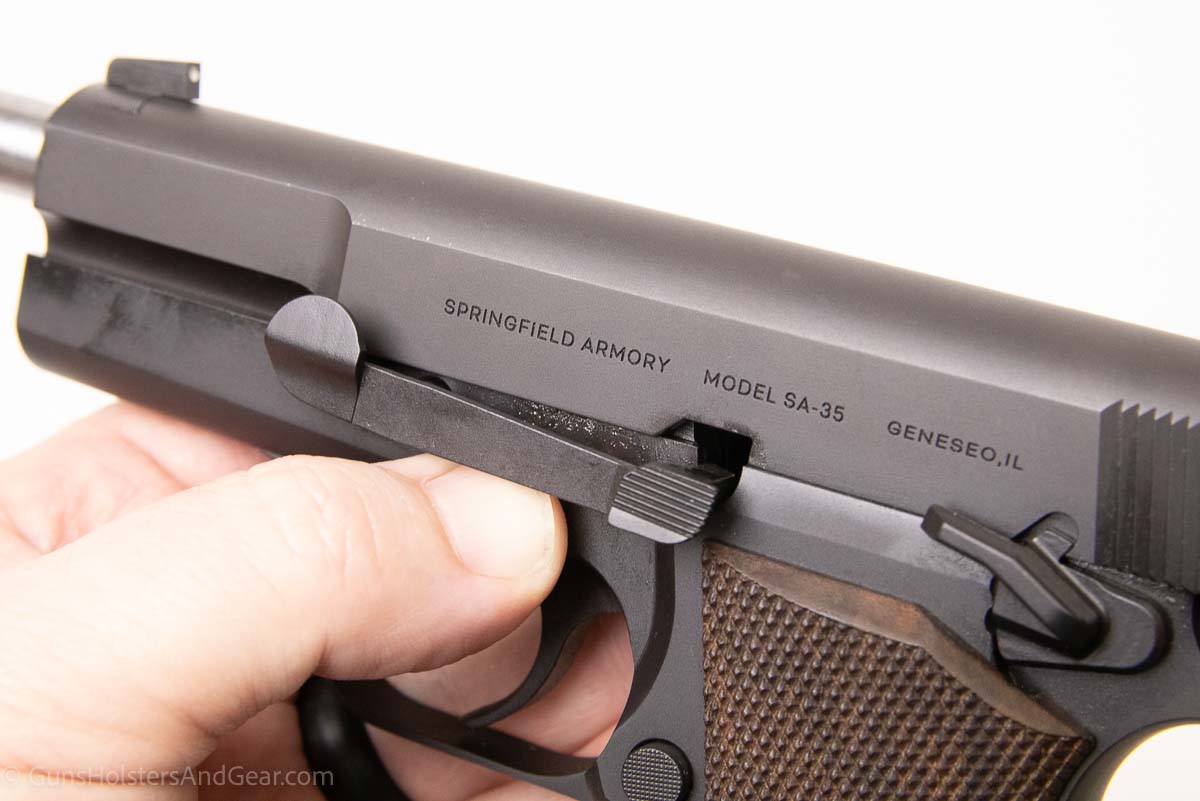
If the slide stop lever doesn’t wiggle or come out easily, check that you’ve locked the slide to the rear using the safety and not the lever itself.
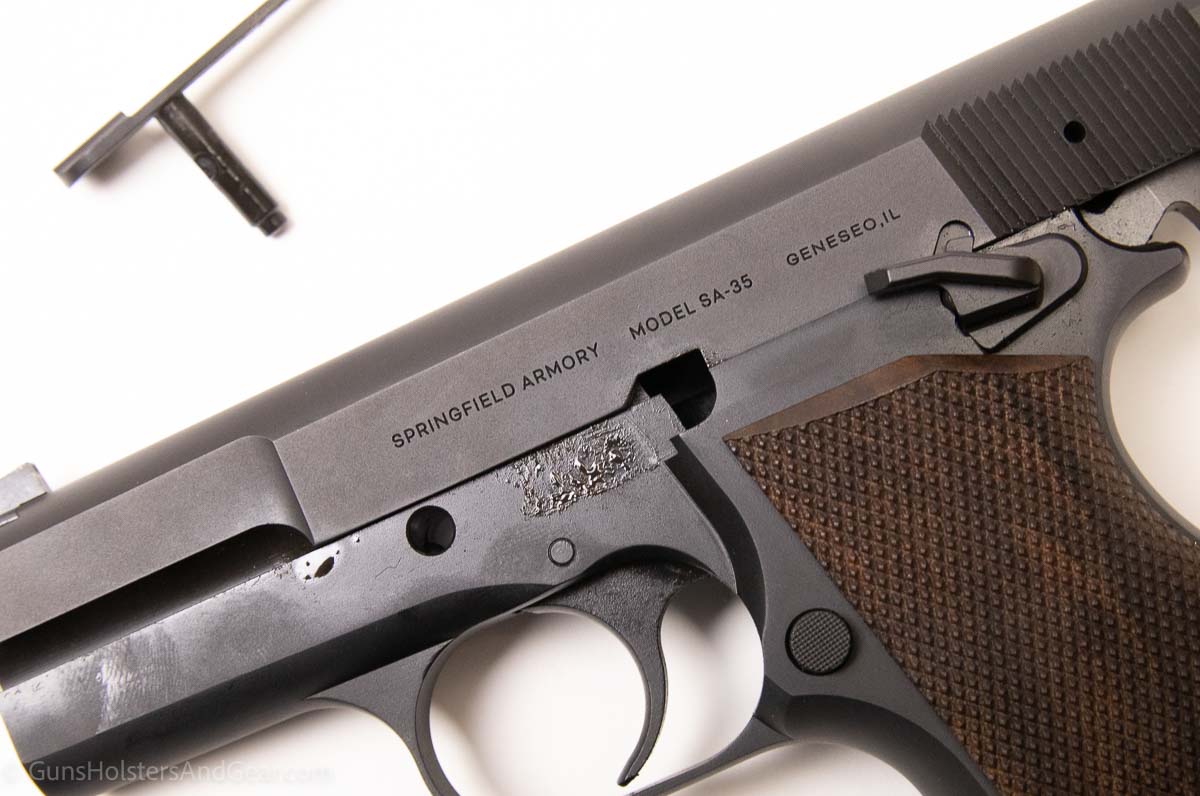
Step 4 – Carefully Remove the Slide
Once the slide lever is out of the gun, the slide will come off of the rails. However, it is still under tension – so be careful with this step!
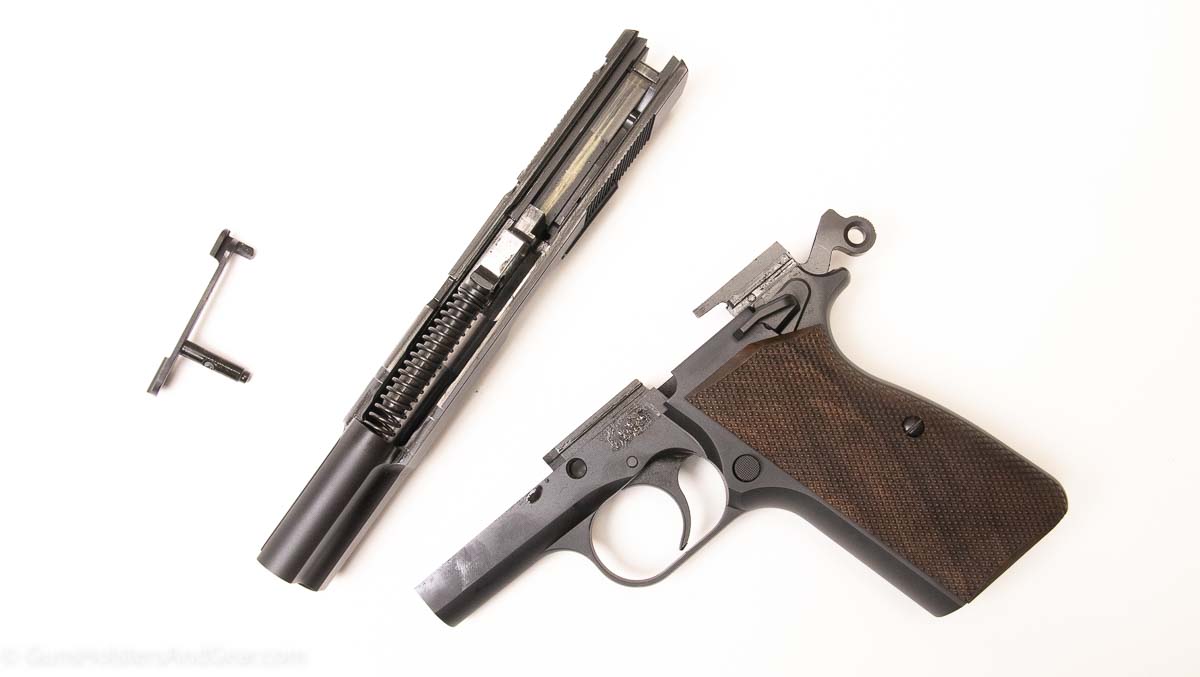
With a firm grasp on the slide, push the slide to the rear and disengage the safety. You can then slide the entire SA-35 upper assembly off of the frame.
Step 5 – Remove Guide Rod, Spring and Barrel
Once the slide is removed from the frame, turn the slide upside down so that the sights are facing down.
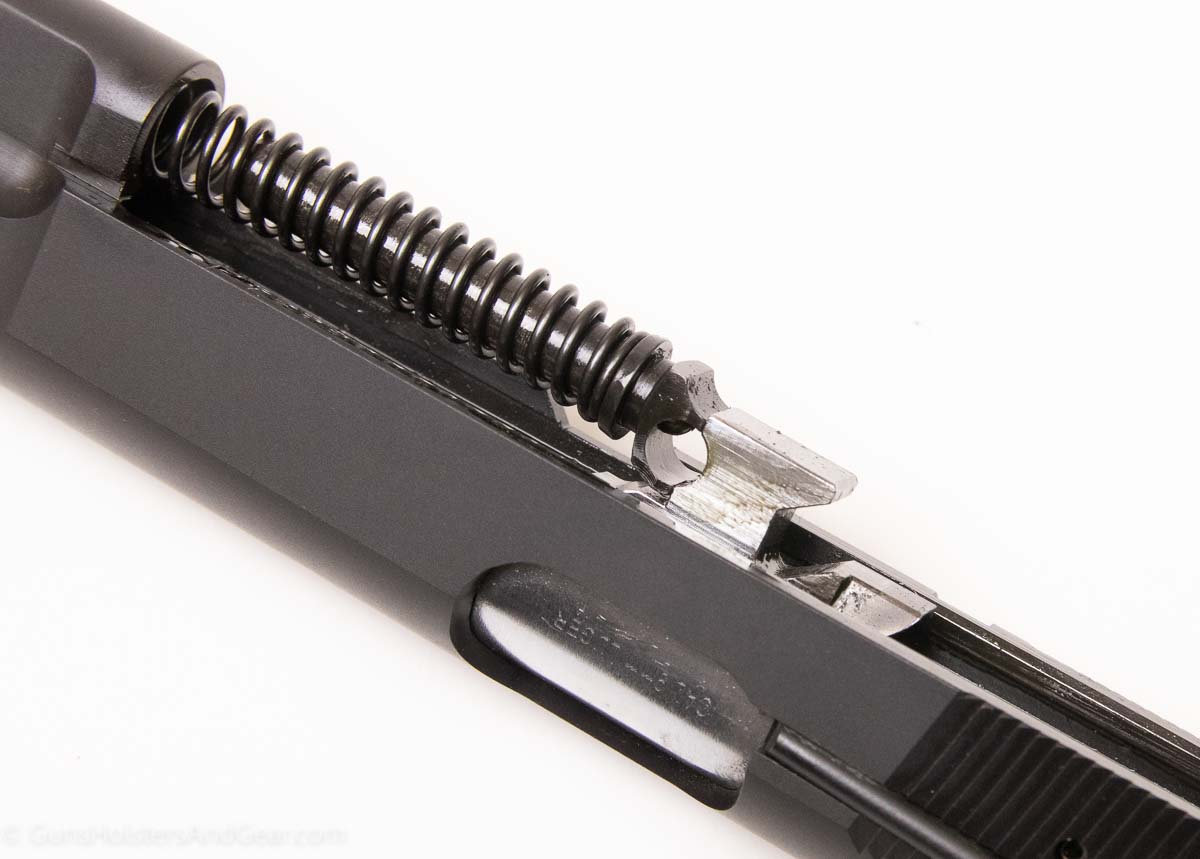
At this point, you can push the guide rod forward and out of the barrel’s notch. The rod and spring will lift out. You can then lift the barrel out of the slide.
Step 6 – Clean with Your Favorite Solvents and Oils
Clean the pistol using normal cleaning techniques.
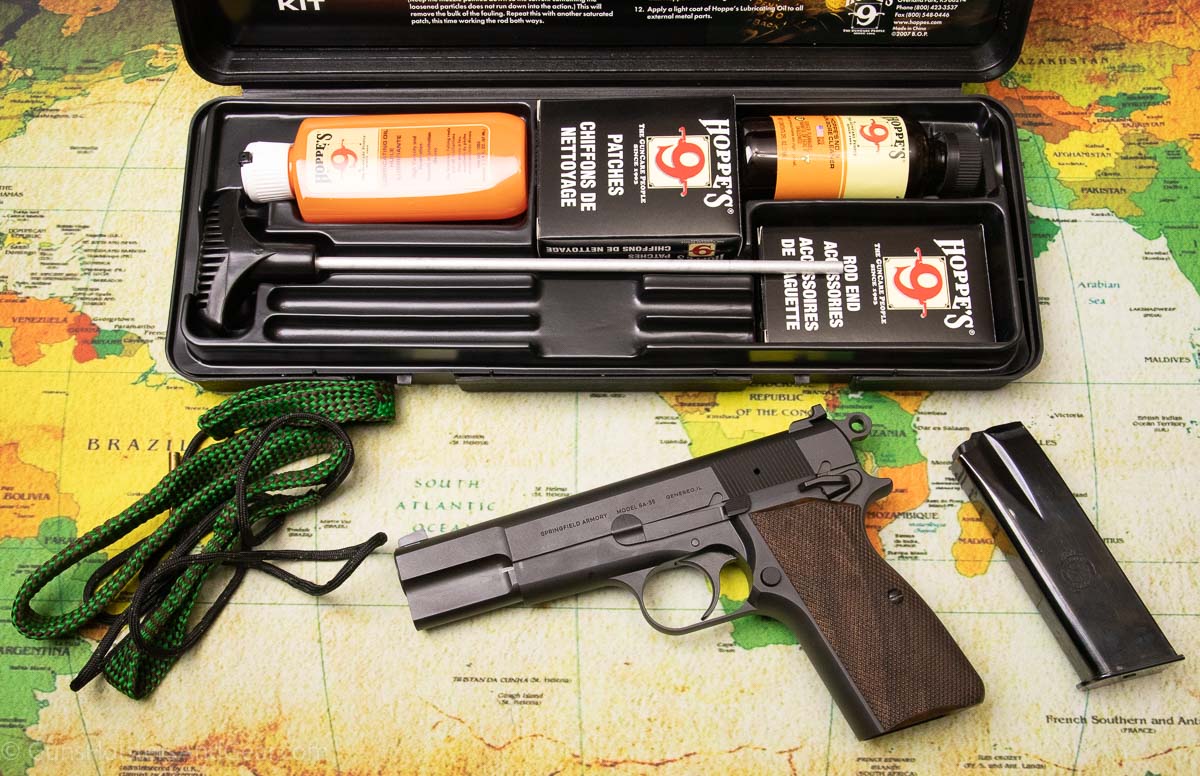
Step 7 – SA-35 Reassembly
To reassemble the SA-35, you simply reverse the steps.
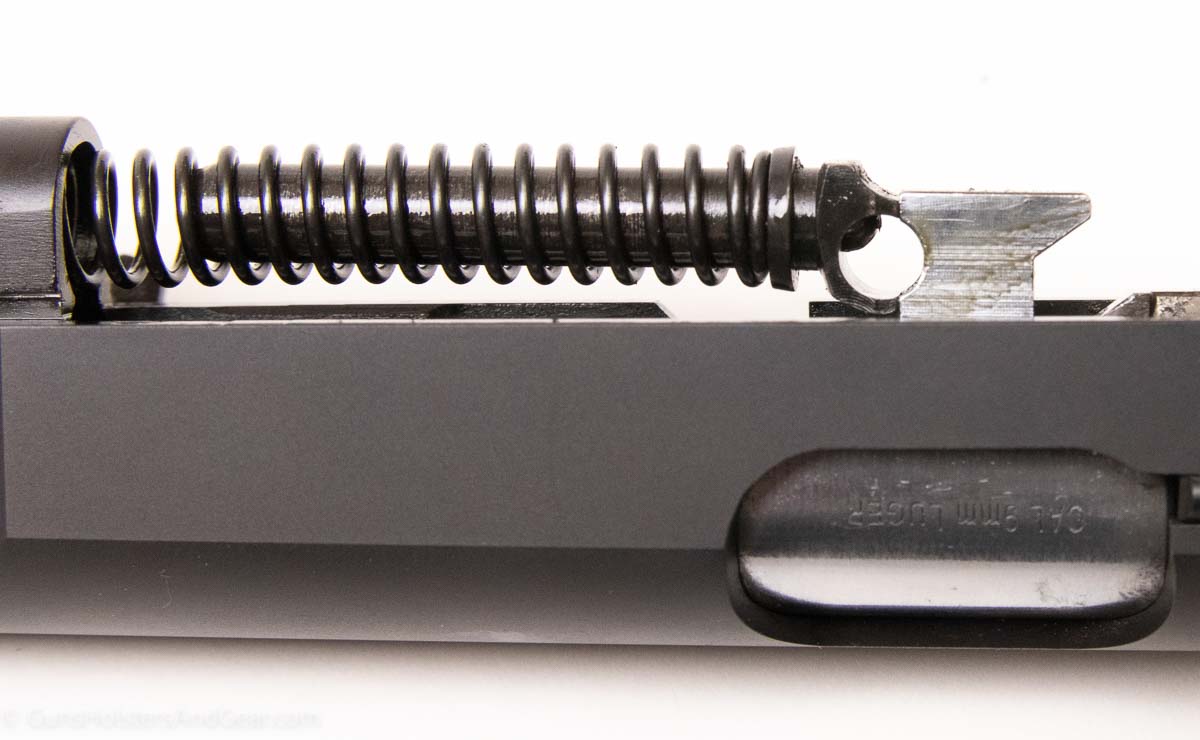
However, you want to be careful when inserting the guide rod and spring into the slide: align the hole in the guide rod down. This will ensure the slide stop will slide back into place after you put the slide back on the frame.
Final Thoughts
The Springfield SA-35 is an amazing gun. The aesthetics are excellent as is the reliability and functioning of the 9mm pistol.
Keep in mind that this is not a true Hi-Power clone. While the looks are very similar and many parts are interchangeable, the SA-35 benefits from nearly a century’s progress in metallurgy, machining and manufacturing experience.
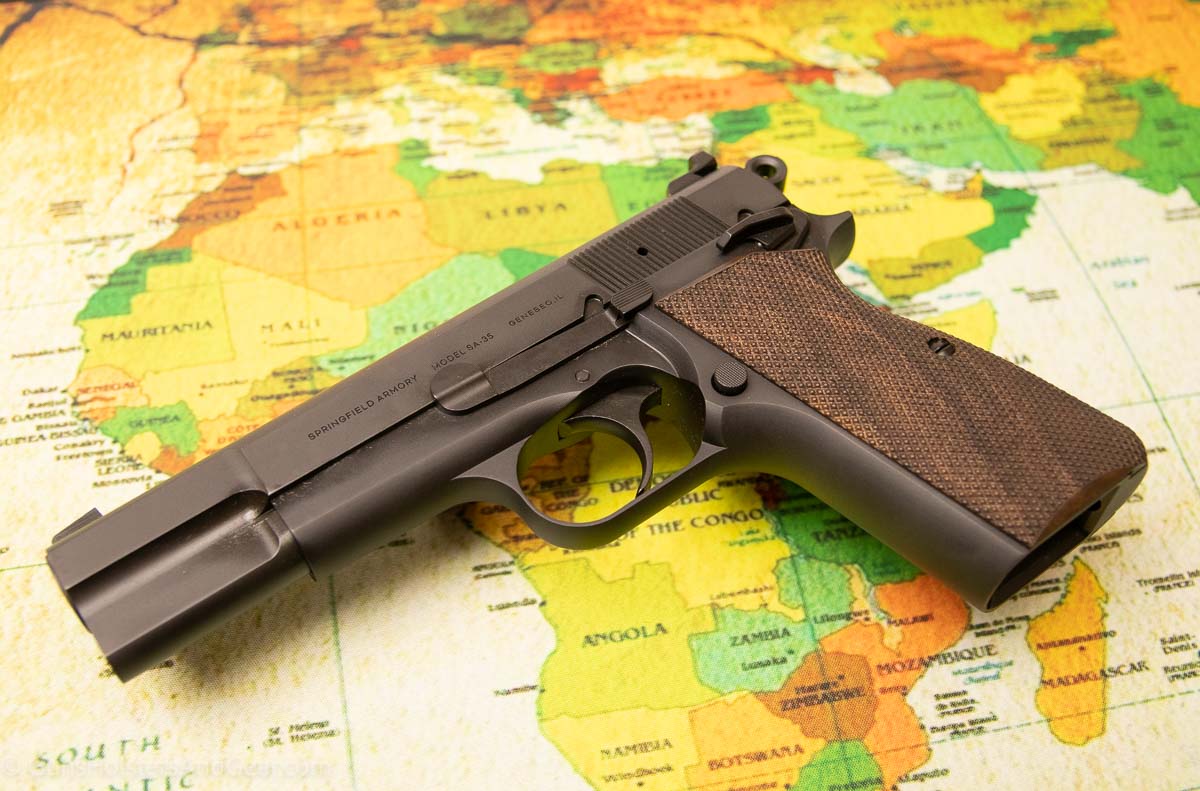
Springfield Armory makes a big deal about not calling the gun a “classic.” The company wants the SA-35 to stand on its own, but I believe this gun is destined to become a classic in its own right.
If you can find one, I recommend buying it. The suggested retail price of $699 is a steal for a gun of this quality.
At the time of this writing, the guns are in full production, but demand far exceeds supply. Consequently, they are selling for 2x-3x the MSRP on places like GunBroker.
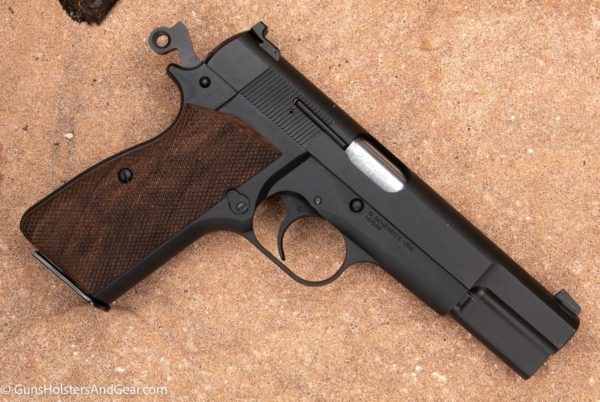
Purchasing the SA-35
As I mentioned earlier in the article, SA-35 pistols are very difficult to find due to heavy demand. I hope this will moderate.
Until then, I suggest trying to grab one through our affiliate links:
Last Update: 4/25/2022
Disclosure
As with all of my reviews, I provide a full disclosure so you are aware of potential biases that may impact what I’ve written.
First, Springfield Armory is not a sponsor or advertiser of GunsHolstersAndGear. In fact, I do not accept advertising from anyone at the time I wrote this article.
Second, the SA-35 was loaned to me by Springfield with every expectation that it be returned. As I really like the gun, I’ve contacted the company about buying it from them.
Third, while there is no direct influence from Springfield Armory on any aspect of this review, I provide contract work for SEO and editing work on TheArmoryLife.com. The company doesn’t tell me what to do or write on my own sites, and I provide my honest opinions on all guns – including theirs. However, it is a potential bias you need to know about.
Lastly, GunsHolstersAndGear is a family-owned business. I earn money through the use of affiliate links to places like Palmetto State Armory, Amazon and Optics Planet. If you use one of these links to purchase something, I earn a small commission.
Please leave your thoughts on the SA-35 or my review in the comments section below. I only ask that you keep the comments civil and profanity-free as this is a family site.
Thanks for reading and your continued support!
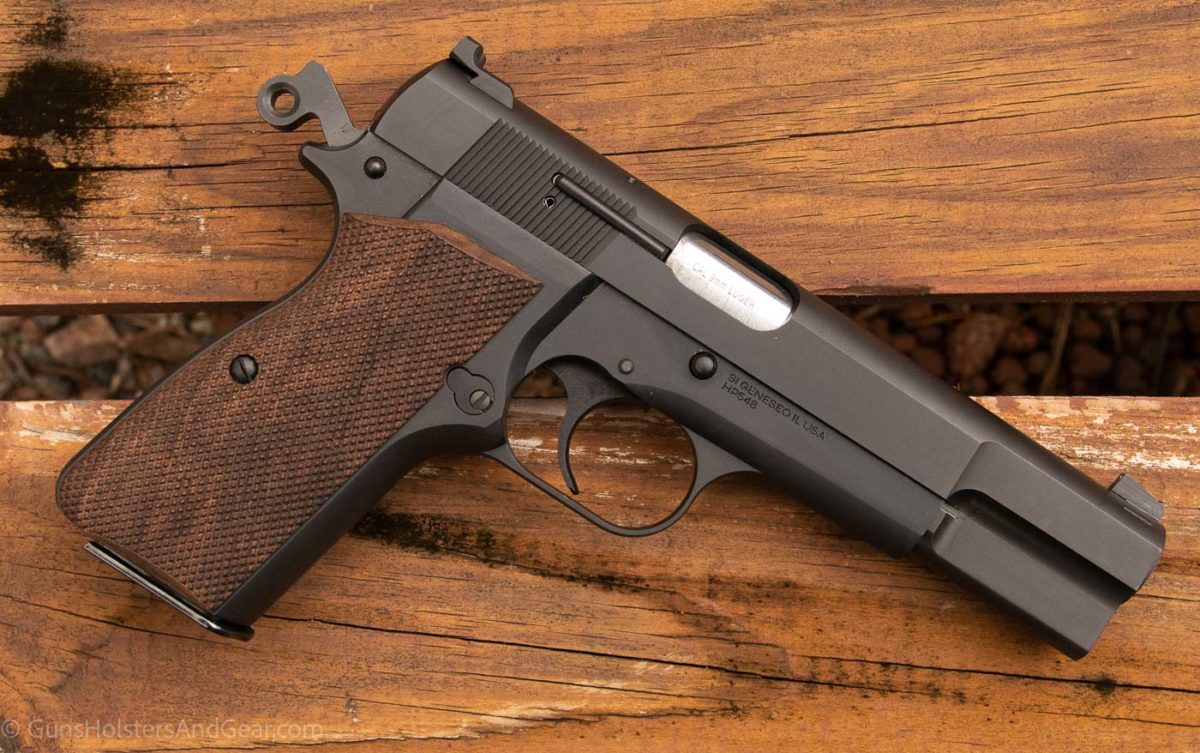
13 replies on “Springfield SA-35 Review: Not Your Daddy’s Hi-Power”
Finally, a gun I can excited by! I’m tired of all the plastic guns. This is a real steel pistol and will make a great addition to my safe!!
Been a P35 shooter going on 40 years or so. Started with a MkII in 9mm in the 80s and ran BALL, mainly 115 gr., WINCHESTER, REMINGTON, FEDERAL, hand loads and some SUPER VEL that was left over at my parents MERCANTILE when they decided to not go through the hassles of FFL license that started in the late 70s. Then, I found a MkIII in .40 S&W and bought it on the spot… 10 Rd. BILL CLINTON mags and the disconnect no less( I can’t stand mag disconnect… I don’t even like Safteys… Six shooters don’t have em, RIGHT???)… The MkIII is a real eye opener at first… It barks and bites. I went to that because of bears… Black Bears that is… Had a lotta run ins w/ them bird hunting in MICHIGAN s U.P. You couldnt carry slugs or buck while bird hunting back in the mid 1990s, and I wanted the extra power the .40 gave over 9mm at that time. Now, with bonded ,& monolithic bullets, I’m a 9mm guy. The extra 2 caps on board is a great improvement. No mag disconnect is , too. And $699??? That’s a great deal for an all steel burner of this quality. Period. And this one isn’t for Black Bear protection. My only real issue is the cost of extra magazines and the fact that a battle pistol SHOULD BE SOLD WITH A MINIMUM OF THREE. ??? whats up with ONE MAG??? You had to buy FN magazines & they were about a $100 each for my MkIII… I like a minimum of 4 with a carry pistol, one in battery, one on my inside right ankle w/ a backup auto knife, 2 on my belt… I’d throw one in a pocket and ??? 6-8 more in my Ruck if I could,too.
Thank you for the excellent review on take down on the SA 35, especially the cleaning and the use of the safety. Very impressed with the feel of this gun, this is the way a gun should feel, and I am almost 100% 1911. Springfield hit another home run. Should come with 2/3 magazines. Ordered extra from Springfield today.
Springfield Armory needs to loosen up with a spare mag inclusion. It is the same with their Ronin Line. Only 1 magazine. When you lay out over 5 Benjamin’s for a pistol . You should get 2 mags… come on Springfield!
I had a Browning Hi Power and loved it. I passed it on to one of my sons, kinda wish I hadn’t. I really like the looks and sound of this as an improved version. I’ll be buying one.
There seem to be several reviews saying the extractor is bad, leaving empty cases in the chamber (interestingly enough, at least one such review is a company that specializes in “improving and enhancing” BHPs….maybe a biased review, maybe I’m just cynical ….)
I haven’t run into that issue. It might be a thing, just one I haven’t seen. I asked around at the local gun shop and they hadn’t had any complaints. But, they haven’t been able to get a lot to sell yet, so it’s a small sample size.
-Richard
Great to read a review based on thorough testing, with an honest, clearly written analysis by a gun writer with no financial or other obligations to the manufacturer. Sounds as if the SA-35 will be a major improvement over the Canadian WWI-era P35 that I once owned then sold because of its’ poor trigger and mediocre accuracy.
Since the originals came in 9 mm and .40 have you heard any talk that Springfield might issue future SA-35s in .45?
Not that I’ve heard. Springfield definitely likes the .45 though, so it’s a possibility.
-Richard
Good article. I hope that SA will produce a 10+1 round version, with an ambi safety, for obvious reasons.
Welp, here it is.
This was inevitable to happen, and I’m glad Springfield took the lead in bringing back this classic Classic.
No other handgun in all of gundom appeals to me more than the Browning High Power / MP-35. The sleek lines, hand feel ergonomics, accuracy, reliability is truly in a self defined class of it’s own.
I own an early 90s MkIII, and I’ve requested it to be buried with me when I meet trails end.
Mine has always been reliable with the old style Federal 9BP loads, and other than feeding it ball rounds, nothing else has ever been fired in it.
This gun is totally reliable and very predictable to me, its never offered surprises other than ongoing amazement. If ever you wanted to own a HP, now is your chance. Although its not a Browning, the SA-35 appears to be a more refined version of it’s original incarnate.
Once the price drops to MSRP, or lower, I’m sure ill pick one up.
Great looking pistol. I just had the local gun store put one on hold. Is the barrel a one-piece barrel (unlike the original which is a two-poece barrel)?